






























BY ADAM MOSES
An off-duty IDF soldier has been hailed a hero following his murder in a stabbing attack at Hutzot Karmiel shopping centre in Karmiel yesterday.
Aleksandr Yakiminsky, 19, from Nahariya, served in the 71st Battalion of the 188th Brigade.
Yakiminsky, despite being critically injured after being stabbed in the neck on the second floor of the centre, chased after the terrorist and neutralised him before collapsing. Paramedics evacuated him to Galil Medical Center where doctors were unable to save his life.
Security officers identified the assailant as Jawwad Omar Rubia, 20, an Israeli citizen from the Arab town of Nahf, near Karmiel. No group has yet claimed responsibility for the attack.
Professor Masad Barhoum, Medical Center director, said doctors fought to save Yakiminsky.
“We gave him many blood transfusions, but despite all efforts, we sadly had to pronounce him dead,” he reportedly said.
Another soldier from the same battalion was seriously wounded in the attack.
Barhoum confirmed they had stabilised, noting: “He was conscious, and we calmed him down and treated him immediately.”
News outlets reported that police closed the centre to conduct a search for accomplices. They have since arrested Rubia’s sister, who worked at Karmiel, his parents and brother for questioning.
Police confiscated computers and equipment to determine Rabia’s movements before the attack.
Police have warned that terrorists may be in area.
“We are unfortunately familiar with these kinds of attacks,” spokesperson Eli Levy said. “We cannot rule out the possibility that the terrorist had help or that there were others still at large.”



BY DAVID SAFFER
The release of 55 Palestinian security prisoners including Shifa Hospital head Mohammad Abu Salmiya from an Israeli jail on Monday due to ‘overcrowding’ has resulted in a political storm.
Salmiya was arrested within weeks of the 10/7 terror attack on suspicion of allowing Hamas to use the hospital as an operations centre.
Videos of Salmiya being greeted in Gaza has caused outrage across Israel. Shin Bet’s decision has been castigated. But they have hit back, claiming ministers, including National Security Minister Itamar Ben Gvir, ignored warnings for nearly a year about a lack of cells for terrorists from Judai & Samaria and Gaza Strip.
“Requests were forwarded to all the relevant parties (but) the number of cells did not increase as needed,”
Shin Bet, which reports to Prime Minister Benjamin Netanyahu’s Office, noted in a statement.
Netanyahu said the High Court was partially responsible but opposition leaders said the government had failed in its duties.




From individuals items and specialist collections to complete house clearances, removals, and probate valuations. We do as much as you need - just ask !!!



• As an independent broker acting on your behalf, I aim to get the highest prices for your pieces
• No need to worry about posting your valuables
• I sell through many different auction houses, high-end dealers, collectors and private clients
• With over 18 years in business you will always receive my personal discreet one-to-one service
• Free consultations at your convenience
Netanyahu has ordered an immediate investigation. His office stated: “The identity of the released prisoners is determined independently by security officials based on their professional opinions.”
Shin Bet examines the ‘perceived danger’ of detainees including Hamas’s elite Nukhba force and Gazan terrorists due to fears of future attacks.
Although Salmiya met danger requirements, Shin Bet are to investigate his release.
The Israel Prison Service, which reports to Ben Gvir’s Ministry, criticised “false publications” regarding Salmiya, noting: “IPS does not make decisions on its own to release prisoners of any kind.”
Netanyahu has announced a new body from the Defense Ministry, IDF, Shin Bet, and National Security Council to approve the release of prisoners whose interrogation is completed.
Gallant and Netanyahu distanced themselves from the furore.
Gallant’s office claimed he did not know in advance about the release of Salmiya.
His office stated: “The authority for incarcerating security prisoners and their release is under the Shin Bet and the Israel Prison Service (IPS), and is not subject to the approval of the defense minister.”
Ben Gvir, despite
Shin Bet comments, has called for Shin Bet head Ronen Bar to step down. He raged. “It’s time the prime minister stops Gallant and the Shin Bet chief from carrying out independent policies contradicting the positions of the cabinet,”
Diaspora Affairs Minister Amichai Chikli called for an explanation from Gallant.
Minister of National Missions Orit Strok added: “It is inconceivable to make such a move without government approval. If you requested our consent on a hostage deal, it is beyond imagination to release terrorists without getting something back. I demand to stop this and convene the government.”
Yisrael Beiteinu chairman Avigdor Leiberman stated: “The decision to release him is a moral outrage and abandonment of security.”
National Unity leader Benny Gantz said the government had made a “moral and ethical operational error” and was not fit to lead the war.
Opposition Leader Yair Lapid added: “This is what moral and functional disintegration looks like.”
Avi Marciano, father of Corporal Noa Marciano, murdered inside Shifa hospital, reacted with anger.
He told Israeli media: “I am willing to accept the release of those who have a part in my daughter’s murder as part of a hostage deal, not like this… We found out from the news. It feels like they are killing us again each time, that they are ignoring us. Those who are responsible for October 7 still govern us and are still responsible for the failures that happen every day, both in the government and in the military… I don’t know who is guilty, but I know who is responsible, the prime minister, the cabinet, the IDF and the Shin Bet.”
Marciano called on Israelis to pressure the government to launch an immediate inquiry.
“In a proper state, this would have happened nine months ago,” he said. “Those who failed on October 7 and before still govern us, the reins are still in their hands, they continue to fail time after time.”
BY DAVID SAFFER
Jewish organisations have condemned antisemitic comments made to Conservative candidate Rabbi Arnold Saunders
Deputies has expressed disgust at the abusive treatment he experienced.
“The video shows that some of the attendees took issue and the footage clearly shows the rabbi was being targeted in this

outside a mosque in Manchester during a recent ‘meet and greet’ event (June 21).
The Tory general election candidate for Bury South, who had been engaging with Masjid Bilal Islamic Centre members in an allotted slot, was invited to speak by mosque elders.
Disturbing social media footage of the incident shows Rabbi Saunders, a Salford councillor, sitting on a chair outside the building when a man, referring to Israel’s operation in Gaza following the October 7 terror attack by Hamas, allegedly shouts at him to ‘condemn the IDF’. Before having a chance to respond, he is told to ‘leave’ as ‘nobody wants you here’. Rabbi Saunders tried to tell the individual he was not an MP, but the man shouted at mosque elders to ‘tell him to get lost’. After further insults, which lasted around four minutes, Rabbi Saunders left with assistance from security staff.
Reflecting on the incident, he said, “I visited the mosque at the invitation of the president and consent of the imam. The event was intended to meet and greet worshippers before and after Friday prayers. There were around 500 people there and the vast majority very courteous. I had been warned some people might want to engage with me and there were a number of individuals who took exception to my presence and became abusive and were quite intimidating. On the whole the visit went well and I thank the mosque for inviting me, but it saddens me that some individuals tried to spoil it.”
The mosque has since apologised to Rabbi Saunders but the Board of
fashion due to his religion,” a spokesperson said. “We urge all who care about the health of our democracy to call out this bigotry.”
Campaign Against Antisemitism welcomed the mosque’s apology but warned about such rhetoric.
A spokesman said: “Voters have every right to make their views known, even passionately, to candidates for Parliament. But there is absolutely no excuse for the sort of abuse that was directed at Rabbi Saunders, which included accusations redolent of classic antisemitic tropes like the blood libel. The only silver lining was that some of the other people present appeared to reject the rhetoric and intimidation. But these scenes should serve as a wake-up call to politicians and civil society as to just how sectarian our politics are becoming.”
The Jewish Representative Council of Greater Manchester said in a statement: “Rabbi Saunders is a much-respected communal figure and we unequivocally condemn his treatment in this video. It is unquestionably antisemitic and we expect action to be taken.
“The incident occurred following an invitation by the mosque to meet their congregants. As an organisation we were delighted to invite and welcome members from the mosque. The fact he has been attacked emphasises how individuals are importing the tragic conflict taking place in Israel and Gaza onto the streets of the UK.
“This is manifesting itself in politicians campaigning in a general election being targeted, abused and unable to freely
move around the constituencies they are seeking to represent. When politicians are unable to speak about their views in public, have meetings disrupted and their offices attacked, it constitutes a real risk to our democracy. We hope that there are no further scenes of this nature as we approach polling day.”
Jonathan Metliss, Action Against Discrimination, said the unprovoked and abusive treatment of Rabbi Saunders was indicative of the antisemitic behaviour of sections of the Muslim UK community towards Jewish communities that includes “so called” peace marches where anti-Israel and anti-semitic slogans are chanted.
Metliss added: “Established authorities
including the police and local politicians must seriously clamp down harder on this behaviour, arrest and charge all known perpetrators.”
“The event was well received and the Rabbi was welcomed, and most people present engaged positively with the Rabbi,” the mosque reportedly said in a statement. “Unfortunately, one or two individuals questioned the Rabbi in a hostile manner and this clip has been widely circulated. This clip was recorded by one of the individuals himself.
“The Rabbi was a guest of the mosque, and he was treated inappropriately and disrespectfully. Any genuine political questions should have been raised respectfully. We regret what has happened, we have already apologised to the Rabbi for how he was treated and wish to extend our apologies to others who have seen the clip and are upset by it.”
The mosque added that the incident was not reflective of the congregation or Muslim community in Bury.
Labour candidate Christian Wakeford for the ward said in a statement: “Both Bilal Mosque and Rabbi Saunders have undertaken many years of progressive interfaith work which is in stark contrast to this individual’s behaviour which is totally unacceptable. We get nowhere in the world without dialogue and this is not representative of Bury South. Despite political disagreements myself and Rabbi Saunders have always had an excellent relationship and I hope he is ok following this incident.”
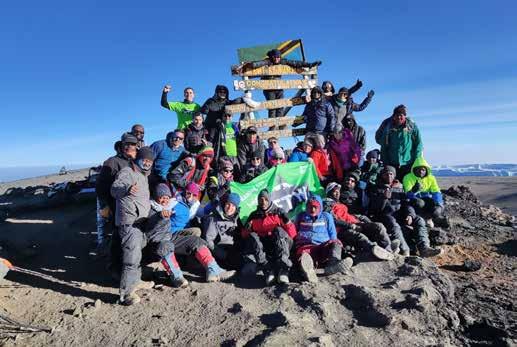
The National Jewish Assembly (NJA) expresses profound outrage over a recent antisemitic incident involving Michael Rowe, Young NJA Chairman. This incident, which occurred while Rowe was campaigning for the general election in Birmingham, is a stark reminder of the unbridled antisemitism that has become alarmingly normalised in our society. Rowe, wearing a kippah, was verbally assaulted by a woman who explicitly stated, “Jews are not welcome here,” while he was leafleting in a street. This blatant display of hatred is not just an attack on one individual but an affront to the entire Jewish community and the principles of democracy
and tolerance that we hold dear.
NJA Chairman Gary Mond condemned the attack, stating, “This act of antisemitism against Michael Rowe is utterly reprehensible and must be met with the strongest response. The normalisation of such hatred in our society is deeply troubling, and it is imperative that the police investigate this incident thoroughly and bring the perpetrator to justice. We must send a clear message that antisemitism will not be tolerated in the UK.”
The incident has been reported to West Midlands Police, who have launched a hate crime investigation. The NJA demands that the authorities treat this
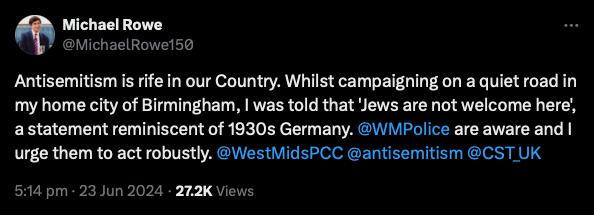
case with the urgency and seriousness it deserves. It is essential that justice is served to ensure the safety and dignity of British Jews.
During a recent GB news interview about the incident, Rowe emphasised the growing problem of antisemitism in the UK, heightened following October 7. “These attacks and racial slurs are escalating, and the pro-Palestine rallies have only exacerbated the situation,” he noted. “While everyone has the right to freedom of expression and protest, this does not extend to insulting and threatening others.”
The NJA urges the British Jewish community to remain vigilant and continue standing up against antisemitic hate. The NJA remains steadfast in its mission to advocate for the rights and safety of British Jews. This incident
underscores the urgent need for robust measures to protect against hate crimes and to uphold the values of respect and equality.





• Prime location between Jerusalem / Tel Aviv
• English-speaking community
• Prices start at just NIS 2M
• 20% downpayment
• 1200 units - 3,4,5 rooms / penthouses
• Superior technical specifications
• Country club with outdoor pool
• Spectacular views
• Guaranteed by Bank Hapoalim
• Built by Electra Construction
• Occupancy 2029





BY HARRY SIMONS
Dr Felix Klein has been awarded the
Rosen Prize by the Conference of European Rabbis.
German Federal Minister of the Interior Nancy Faeser attended the ceremony at the Representation of the State of North Rhine-Westphalia in Berlin.
The CER recognised Klein’s dedication to promoting Jewish life and fight against anti-Semitism.
Klein has served as Germany’s Commissioner for Combating Anti-Semitism
since May 2018, after a distinguished career in the German Foreign Service.
Klein has spearheaded a comprehensive strategy to combat anti-Semitism in Germany. He has focused on integrating Jewish life into political and social spheres, advocated for identifying the roots of anti-Semitism and hatred of Israel, pushing for legislative measures and educational initiatives.
Klein said: “We must unite all societal forces, law, politics, business and civil society, to combat antisemitism and protect Jewish life. “
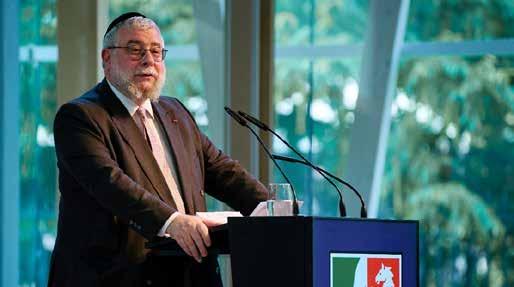
BY ADAM MOSES
Over 100 victims of the October 7 terror attack by Hamas, and their families, are suing Iran, Syria and North Korea for providing support to the terror group.
The Anti-Defamation League $4 billion lawsuit was filed on Monday in Washington, D.C.
ADL and Crowell & Moring law firm have accused the three countries of providing financial, military and tactical support to Hamas. The case is the largest against foreign countries regarding the atrocity. It is the first backed by a Jewish organisation.
The lawsuit alleges Hamas could not have carried out the 10/7 attacks without support of the countries. Evidence cites training, weapons and financial support from Iran, training and financing from Syria, and weapons and tunnel-digging expertise from North Korea.
“Iran is the world’s leading state sponsor of antisemitism and terror, along with Syria and North Korea, they must be held responsible for their roles in the largest antisemitic attack since the Holocaust,” ADL CEO Jonathan Greenblatt said in a statement.
Greenblatt accepts the countries will probably not respond to the allegations but the lawsuit is important to seek accountability.
Nahar Neta is the son of US citizen Adrienne Neta who was killed on Kibbutz Be’eri.
He added: “CER’s recent move from London to Munich demonstrates their confidence in Germany.”
Chief Rabbi Pinchas Goldschmidt, CER President praised Klein’s work: “Few people speak out as consistently by analysing, identifying and combating antisemitism and hatred of Jews in all its forms. His efforts are invaluable for Jews in Germany and beyond. We are profoundly grateful to him and the German government for prioritising the future of Judaism. This prize is a testament to his dedication.”
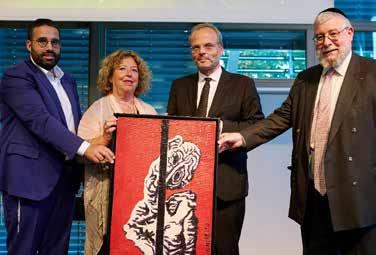
Islamic Revolutionary Guards as a terrorist organisation, are crucial steps. Now is the time for decisive action.”
“While nothing will ever undo the unbearable pain, Hamas caused our family or the brutal losses we’ve suffered, we hope this case will bring some sense of justice,” Neta said in an ADL statement.
“It’s important for us to be able to tell our stories so the world can hear how Hamas has terrorized Israel, the Jewish people, and many American citizens. My mother devoted her life to caring for others regardless of race or religious beliefs.
She was a peace and justice seeker who was active in many civilian efforts to bridge the gap between Jews and Arabs in Israel.”
Filed on July 1, the complaint states that plaintiffs should receive compensation from the U.S. Victims of State Sponsored Terrorism Fund.
The USVSST Fund provides compensation to individuals (or personal representatives of deceased individuals) who hold a final judgment issued by a US District Court awarding the individual compensatory damages. The judgment comes from acts of international terrorism for which a foreign state sponsor of terrorism was found not immune from the jurisdiction of US courts under the Foreign Sovereign Immunities Act (FSIA).
ADL has called on US citizens to lobby Congress regarding the American Victims of Terrorism Compensation Act.
Goldschmidt added: “Antisemitism, whether from left-wing, right-wing, or Muslim extremists, is not just a Jewish problem but a societal one. It threatens our liberal way of life, unity, justice and freedom. We must ensure clarity in this debate and be consistent in protecting Jewish communities, prosecuting perpetrators, and managing migration and integration. Addressing groups like Hamas, Hezbollah, the Houthi and Muslim Brotherhood, and listing Iran’s
Klein received a painting by Moscow-born French-Austrian Jewish artist Alexander Aizenshtat, dedicated to the victims of the Nazi regime’s T-4 programme, a precursor to the Holocaust.
The ceremony featured music by Jewish and Israeli composers such as Jacques Offenbach, Ernest Bloch and Shlomo Gronich.
Klein, a member of the Diplomatic String Quartet Berlin, surprised attendees by playing the violin to the melody of Yeshli Simpatia’.

BY ADAM MOSES
The Simon Wiesenthal Center has condemned reported comments by a Japanese journalist denying Hamas’ October 7 terror attack and demonisation of Israel.
The world renowned centre has called on the Japanese government to denounce disturbing allegations by Miki Otaka in a YouTube video about the atrocity.
Rabbi Abraham Cooper, at the SWC, has written to Japanese Ambassador to the United States, Shigeo Yamada for an official response.
Otaka reportedly states 10/7 was a “fabrication”, Gaza is “contaminated with radioactive soil”, Israel wants to settle Jews in Gaza and also has imposed a “total blockade” on Gaza.
Aside from antisemitic tropes the video implies Israel pays $3.5 billion to lobby the US and Europe to halt sanctions on Israel.
“They control the media with the power of money,” Otaka asserts. “There were videos and photos of the atrocities committed by Hamas. However, a report came out saying these were actually fabrications.”
Cooper informed Yamada: “We all know the power of social media to influence people and in the case of Ms. Otaka, there are those who would take
this journalist’s
screeds as fact since she is influential enough to regularly write for a publication that carries articles written by members of the Japanese Diet.”
Cooper noted Otaka had ‘liked’ a post alleging there was a nursery in Auschwitz and linked Holocaust denial to 10/7 denial.
Cooper also cited examples of antisemitism in Japan, including the cancellation of a hotel reservation in Kyoto for an Israeli tourist and a decision by Nagasaki to invite a Palestinian Authority envoy to an annual peace commemoration for the 79th anniversary of US atomic bomb. Japan has yet to invite Israel.
Regarding Nagasaki’s decision, Cooper said: “We are worried that the pro-Hamas narrative that exonerates the
terrorists and blames the victim for fighting back is gaining traction in Japan.”
He added: “As a frequent visitor to Japan, I have long valued the good relations between the Japanese people and the world Jewish community. The Simon Wiesenthal Center respectfully urges
the government of Japan to use its moral voice to denounce the denial of October 7 and the demonisation of Israel, and to ensure that Israel and Israeli citizens are not subjected to discriminatory measures for the sin of defending themselves from terrorists bent on their destruction.”


BY ADAM MOSES
Thousands of mourners attended the funeral of the Kossover Rebbe, Rabbi Shraga Feivish Hager zt”l, of Borough Park, Brooklyn last Sunday.
Renowned around the world, the esteemed rabbi, 66, passed away after a long illness last Shabbat at Cornell Medical Center.
The funeral service took place at the Vizhnitz Synagogue before burial in Monsey close to the grave of his father, Rabbi Avraham Yehoshua Heschel Hager, the Kossover-Zalishchiker Rebbe, who died in 1999. Rabbi Avraham was the son of Rabbi Shraga Feivish Hager, the Zalishchiker Rebbe.
The Rebbe’s mother, Rebbetzin Malka was the daughter of Rabbi Yechezkel Shraga Hakohen Sander.
The Rebbe wrote pivotal works including ‘Avdah D’Malka, the two-volume ‘Shabbos Malka Kadisha’ and Mayana D’Malka on Chasidic teachings. His
lectures are published weekly by Mechon Sufu Beriru and audio files are available in Yiddish on phone hotlines.
During the pandemic, the Rebbe organised a socially distant minyan, virtual phone lessons and urged people to stay home.
Born in 1958, he grew up in Boro Park, studying at Yeshiva Be’er Shmuel, then in Bnei Brak, including at the Ponovezher and Lakewood yeshivas.
The Rebbe married Rebbetzin Sarah Rechil, daughter of Rabbi Chaim Wosner, rov of Zichron Meir in Bnei Brak, and granddaughter of Rabbi Shmuel Halevi Wosner.
The couple returned to America where he grew close to the Amshinover Rebbe. Dayan of the Viznitz-Monsey Kehillah in Boro Park, he held the post as Kossover Rebbe when his father passed away.
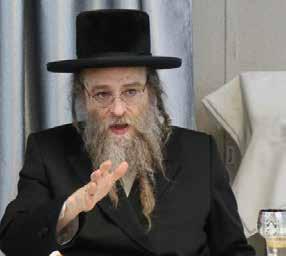
A renowned orator, he was sought globally for advice on all matters of halacha and Torah.
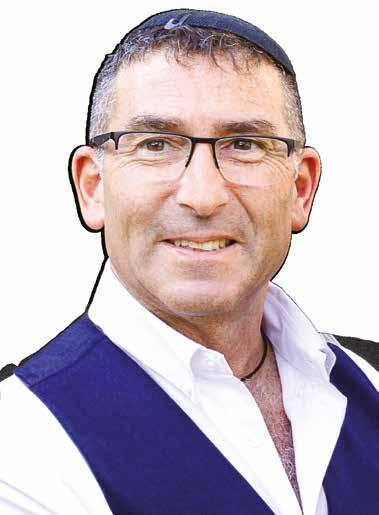
















A part-time Semicha Course in London to be followed in parallel with a career or other studies.
Applications are invited to join the Montefiore Endowment’s Semicha Course’s latest 4–5 year cycle, for the beginning of Hilchot Basar Bechalav in September 2024. The study includes Shabbat, Niddah and other areas of practical Halacha. It also aims to teach future rabbis how to respond to the halachic challenges of fast-changing contemporary life.
Students will be prepared for Semicha Yoreh Yoreh, issued jointly by the Montefiore College and by Eretz Hemdah, the Institute of Advanced Jewish Studies, Jerusalem. The Semicha Course is known internationally as a robust and rigorous programme and is recognised for membership of the Rabbinical Council of America.
Applicants must have a sound educational background, both in Torah learning and secular studies. All must have studied in yeshivah and most will also hold university degrees or equivalent. The acceptance of Torah im Derekh Eretz and a wish to serve the community are essential. Students will be encouraged to continue their careers in parallel and will not pay tuition fees.


BY ROBERT FESTENSTEIN
Last week pro-Palestinian protesters heckled Rishi Sunak and Keir Starmer from outside the BBC general election debate at Nottingham Trent University.
Demonstrators protesting both parties’ positions on the Israel-Gaza war were making so much noise they could be heard by viewers at home.
Mishal Husain, the host of the BBC debate, said “If you can hear any noises of ladies and gentlemen or anyone at home, there is a protest taking place outside, which is also an aspect of our democracy and people exercising their freedom of speech,”. Really? Democracy and freedom of speech. How can a raucous mob interfering with a general election debate be exercising a democratic right. Trying to shut down a debate because they don’t like what is
being said is not democracy, it’s the action of a dictatorial mob.
Since 7 October last year the power and size of the mob has increased enormously. Witness the hate marches – claimed to be pro-Palestinian – in London over the last 9 months. I have been criticised for the above description but I stand by it. Part of the criticism has been based on the idea that only a small percentage of those marching hate Jews or even understand the meaning of the phrase ‘from the river to the sea…’. Further, they don’t understand the reality of a ceasefire, the abhorrent absurdity of the claim of genocide or horrific principles which guide Hamas. All this might have been the case during October or November, but now 9 months later I am sure that the numbers of those attending these marches who just think it’s a jolly day out are miniscule. There has been so much publicity about the true nature of Hamas, the falsity of the claims of genocide and the palpable increase in anti-Semitism arising from these marches,
that only a Martian on a day trip could possibly believe these marches are anything other than fuelled by historic Jew-hatred. When democracy starts to break down it is often the Jews who are attacked first. This is precisely what we are seeing, yet so many choose to ignore this. Hamas’s stated aim alongside with destroying Israel and killing Jews and Christians is to destroy the West. They wish to bring down all those institutions which we have relied upon to keep us safe.
The power of the mob is clearly increasing. Whether there is an issue over gender-critical comments, climate change or Israel, the mob is now ready to jump into action, with shrill voices decrying those who disagree with whatever venomous language applies to their particular cause. Those claiming to be pro-Palestinian have damaged British democracy, maybe not beyond repair but certainly noticeably. The intimidation that these people have visited upon us as a community has been appalling. I don’t agree that this is a repeat
of the 1939 Germany. It is not the state that is attacking us today, it is social media, certain trades unions, universities and the BBC. None of these have been elected, none of them are particularly accountable and most of them claim to love democracy. Nonsense. Democracy it is not; mob rule is a far better and more accurate description and whether or not the expected Labour Government does anything about it remains to be seen.
As a parting thought, it will be interesting to see whether or not there is a challenge to Sir Kier Starmer’s leadership by the hard left once the Government has settled in. For all our sakes let’s hope not, the mob has made too many advances already.
Robert Festenstein is a practising solicitor and has been the principal of his Salford based firm for over 20 years. He has fought BDS motions to the Court of Appeal and is President of the Zionist Central Council in Manchester which serves to protect and defend the democratic State of Israel.

community to stand with Israel during its hour of need, reinforcing our unwavering commitment to the Israeli people. As Israel continues to face threats on multiple fronts, this mission provides a unique opportunity to witness firsthand the resilience and spirit of the nation. Participants will have unparalleled access to high-calibre speakers and special guests, offering valuable insights into Israeli politics and military affairs. The itinerary includes exclusive meetings and briefings designed to deepen our understanding of the situation.
Participants will also have the opportunity to meet with an MK at the Knesset, offering an inside
look at Israeli politics and governance. A briefing by a spokesperson from the Israel Police will highlight their critical role in maintaining security and order.
Dalia Hajioff, NJA Events Manager, noted “Just as Churchill inspired a nation to stand firm in the face of adversity, our mission aims to embody that same spirit of perseverance. ‘We Shall Prevail’ is not just a statement; it is a commitment to Israel as it rebuilds stronger than ever.”
The mission will culminate with a tour of the Har Herzl Military Cemetery, where participants will pay respects to those who have sacrificed their lives for Israel’s safety and independence.
Gary Mond, Chairman of the NJA, stated, “In these trying times, our solidarity with Israel is more crucial than ever. This mission not only demonstrates our unwavering support but also provides an opportunity to learn from Israel’s resilience and strength.”
Participants will stay at the 4-star Dan Panorama Hotel in Jerusalem, and the NJA is offering a 10% discount for bookings made by July 22. The cost is £965 per person (double occupancy) and £1280 (single occupancy).
For more information and to register, please email dalia@nja.org.uk.
Join the NJA in showing that our commitment to Israel is unwavering. Together, we shall prevail.
s h k e l o n r o p e r t i e s
SEA-VIEW APARTMENTS FOR LIVING OR INVESTMENT



Savvy Modern Or thodox Anglos are racing to buy the last available sea-view proper ties in Ashkelon right opposite the Marina!
• We specialize in this beautiful city which is fast becoming the SAFEST location in Israel. Tell us what your ideal is, whether house or condo, and we’ll find it for you!
• Only 30 minutes to airpor t and one hour to Jerusalem
•
•
•
New high-speed trains, only 40 minutes to Tel Aviv
Proven to be an excellent investment
Earn r ental money when you ’ re away
Mor tgages available at no extra fee
• Close to many shuls and the ver y best beaches
• Only 20% down and balance upon completion
• Superior interior design ser vices
• Largest range of resales available
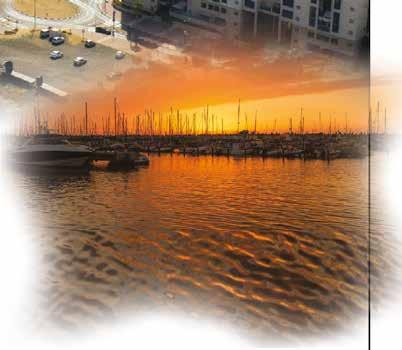




Shelanu, an organisation dedicated to building a vibrant community for Israelis living abroad, recently organised a profoundly impactful ski retreat that has left a lasting impression on all who participated. This retreat, set against the serene backdrop of the French Alps in Chamonix Mont-Blanc, was more than just a ski trip; it was a week-long journey of healing, connection, and empowerment. It exemplified the transformative power of immersive educational and Jewish experiences, a core belief of Jewish Futures, of which Shelanu is a proud member.
Since the traumatic events of October 7th, life for many Israelis has been marred by grief and stress. The participants on this trip included 33 individuals, most from the community Shelanu has built in the UK but also joined by some survivors of the horrific Nova massacre and soldiers who have recently fought in Gaza. For them, this retreat offered a much-needed escape, an opportunity to step away from their daily struggles and reconnect with themselves, with others, and with their Jewish identity.
The retreat, which began as a simple ski trip, quickly evolved into a comprehensive experience for the soul. Through a thoughtfully curated schedule of activities, participants engaged in sessions that fostered learning, sensitivity, empathy, and personal growth. The retreat provided a sanctuary where participants could process their experiences and gain strength from the supportive community around them.
The success of this retreat would not have been possible without the dedicated efforts of the Shelanu team. Special thanks go to Noga for her impeccable management of the schedule, ensuring that every workshop and logistic detail was handled with care. Itamar’s healing yoga sessions provided much-needed physical and
emotional relief, while Omri, the dynamic ski instructor, guided the group with expertise and enthusiasm. Additionally, Gil’s logistical management ensuring all the participants had everything they needed for each day of the trip and Ziv who organized the accommodation, all added to the overall positive experience. The delicious food provided by the chefs throughout the retreat were also a highlight, nourishing both body and soul.
Shelanu’s mission is to create a strong, supportive community for Israelis living outside of Israel, and this retreat embodied that vision. The trip demonstrated how time away from the pressures of daily life can foster profound personal and communal growth. It highlighted the importance of taking time for self-care and reflection, especially during challenging times.
For the participants, this retreat was not just a break from the routine; it was a powerful reminder of the strength and resilience of their community. It reinforced the belief that through connection and shared experiences, healing and growth are possible.
Shelanu is already looking forward to organising future retreats and events that will continue to provide meaningful experiences for the Israeli community abroad. Shelanu is committed to offering opportunities for individuals to connect deeply with their Jewish heritage, with each other, and with their own personal journeys. The Shelanu team is eager to reunite with the wonderful individuals who made this retreat so memorable and to continue building a community that supports and uplifts each other in times of need.
Reflecting on the retreat, one participant



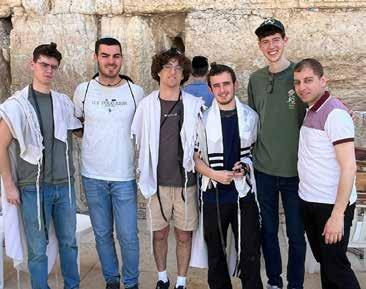
This year, Aish UK has coordinated a series of immersive trips to Israel for singles and students. This summer has already seen two campus students’ cohorts experiencing two-week journeys filled with volunteering, cultural activities, and powerful encounters with October 7th Survivors and soldiers as well as Holocaust Survivors. A third group is set to depart later in July, promising to be yet another incredible experience. A few spaces remain.
Although the itineraries for each trip vary, they all include a mix of experiences unique to Israel as well as volunteering opportunities making a tangible difference to the people of Israel. The first trip kicked off with a scooter tour of Jerusalem, offering students an exciting and alter-
the bikes for those who need them to travel, but also about understanding the broader impact of their work on the community’s well-being.
The groups each visited Hostage Square in Tel Aviv, a significant site commemorating those taken hostage on October 7th, those who were killed and resilience of those affected by terrorism. The students engaged deeply with the stories of the hostages and the ongoing struggles faced by many Israelis.
Another highlight was volunteering on a farm where students helped pack produce for distribution to local shops. This task took on deeper significance as they learned that many agricultural workers had either left to go back to their home country or many who were called up to serve in the army, leaving a gap that needed to be filled. The farm also served as a therapy center, with horses providing comfort and healing to those affected by the war.
In Jerusalem, the students had the profound experience of visiting the Kotel. They also volunteered at Yad Sarah, an incredible chesed organisation that provides medical equipment, social services and many other services to those in need. Here, they sorted and repaired medical devices, contributing to the essential support system for the community.
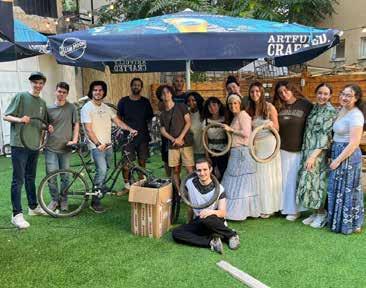
native way to explore the City. This was followed by a poignant session with Holocaust survivor Yosef Lewkowitz, whose tale of survival inspired the students and provided greater context for the need for the State of Israel.
Volunteering is at the heart of each trip, with students dedicating their time to various causes. In Tel Aviv, they worked at a bike repair shop, where they dismantled old bicycles to salvage parts for new ones, supporting a non-profit organisation aimed at promoting cycling as a healthy, eco-friendly transportation alternative. This experience was not just about fixing
presence would genuinely make a difference, but every single place we went, we heard incredible stories of how our help was invaluable. Whether it was assisting on a farm where the farmer’s husband was fighting in Gaza, or supporting a bike repair shop that promotes healthier lifestyles, our contributions were deeply appreciated.”
Strom highlighted the emotional connections formed with the people they met, noting the gratitude expressed by those they helped. “The overriding response from everyone was, ‘Thank you for coming and supporting us, both physically with your volunteering, but also for the moral support it gives to know that you’ve come from outside of Israel to share and care for us.’ This was incredibly powerful for the students to hear and experience.”
The itinerary also included visits to locations that provided a stark contrast between the challenges and the resilience of Israeli society. The students toured areas affected by conflict, such as Sderot and Nova, witnessing the remnants of violence and hearing stories of survival and hope. These experiences offered a modern-day parallel to the Poland trips that focus on the Holocaust, allowing students to connect deeply with the ongoing narrative of the Jewish people.
The group’s volunteering extended to cooking and delivering meals for displaced families and children, showcasing their empathy and desire to make a tangible difference. One of the most moving moments of the trip was a barbecue they hosted for reserve soldiers bringing full circle their week of giving and connecting.
Adina Strom, who accompanied the first group, shared her reflections on the trip, emphasising the profound impact it had on both the students and the communities they served. “We spent a week in Israel volunteering in various different areas, touching on diverse aspects of society,” she recounted. “What was fascinating for the students was to see how much we were needed. Initially, we wondered if our
participated in the Yom Yerushalayim parade, a day marking the reunification of Jerusalem. The parade, filled with dancing and celebration, was a highlight for the group, embodying the joy and pride of the Jewish people in their capital city.
As the trip drew to a close, the students gathered for a final banquet to share their experiences and reflections. They spoke of the deep connections they had made, the lessons learned, and their renewed commitment to being active participants in the Jewish story.
The Aish UK Israel trips have proven to be more than just a summer adventure; they are a journey of personal growth, social and cultural connection, and community service. As the students prepare to pass the baton to the next group, set to leave in July, they do so with the knowl-
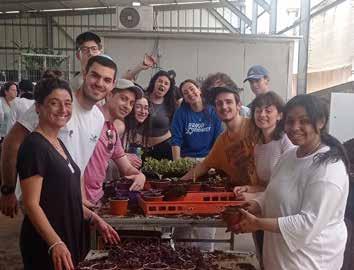
edge that they are part of a larger narrative of resilience, unity, and hope.
One particularly poignant moment occurred in Hostage Square, where the group met an individual who had been at Nachal Oz on October 7th, sharing her harrowing experience. They also visited Takuma, observing the aftermath of conflict and the community’s efforts to rebuild and move forward.
The trip culminated in a Shabbat celebration in Jerusalem, where the group enjoyed a meal on a rooftop overlooking the Kotel. They heard stories of resilience and bravery, such as the tale of Yonatan, named in memory of Yoni Netanyahu, who perished during the Entebbe rescue mission. This story was brought to life even more vividly when, during their Havdalah ceremony, they learned of a successful hostage rescue operation that had just taken place, which was incredible.
The students also
These trips are a testament to the power of volunteering, the importance of connecting with one’s heritage, and the impact of stepping out of one’s comfort zone to make a difference in the world. As Strom aptly put it, “We are the authors of the next chapter of Jewish history, and it’s up to us to add our own chapters to Our Story.”
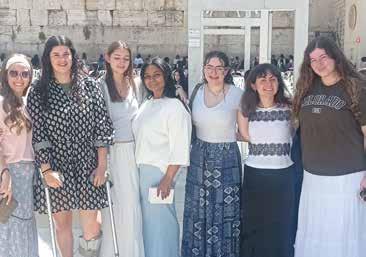


BY RABBI NAFTALI SCHIFF
At a time when Jewish identity and support for Israel amongst our younger generation in particular are being challenged more than ever before, it is clear that powerful and effective educational experiences are the key to continued and thriving Jewish life and commitment. Over thirty years on the coalface of formal and informal education in the UK involving tens of thousands of students over the years provides us with ample corroboration and verification to the fact that the immersive Jewish experiences are the most potent tools at our disposal. As a family of educational organisations, fully committed as we are to ensuring vibrant Jewish Futures - we are passionately focussed upon searching for and facilitating anything and everything that will effectively enhance engagement in Jewish life, in addition to nurturing communal collaboration and the development of partnerships. We have found nothing more powerful than the immersive Jewish experience; be it a Friday night Shabbat table or a trip to a place with a Jewish story, the enduring impact of such lived Jewish experiences is second to none and we believe this is where the community must invest with increased urgency.
For over three decades, Jewish Futures has been at the forefront of providing compelling Jewish travel experiences. Many thousands of young Jews have participated on educational and social journeys that inspire and connect them to their past, bring them face to face with the challenges of the present and result in a refreshing commitment to our collective Jewish future. Our belief in the reframing effect of these experiences is deeply ingrained in our modus operandi which is why each of the member organisations harness trips as a way of delivering their specific messages and focus. Be it the deeply Jewish experience of an Aish trip to many a destination in the world, although obviously principally Israel; the JRoots journey to Poland, Lithuania, Italy or Spain; the FJL internships in NYC or DC, the Gift Giving trips to Israel, the Chazon journeys to Kerestir, Polamd or Israel, all harness the expertise we have fine tuned over three decades in ensuring that a trip with a Jewish Futures organisation is often a life enhancing, Jewishly
impactful one. Other immersive Jewish experiences are also extremely effective in sharing the wealth of Jewish thought, feeling, community and belonging with young people. Inviting guests for a Friday night, participating in a peer shabbaton are also memorable and often illuminating windows into a Jewish life often otherwise unfamiliar to many young Jews today.
The travel experience however has a magic of its own. The excursion accompanied by a social setting in a peer group is enormously effective in enhancing in the Jewish peer group, a sense of belonging and shared culture, beliefs and aspirations.

Today, Jewish Futures encompasses a variety of organisations that provide diverse and impactful Jewish experiences. JRoots, established in 2006, has built an unparalleled educational and logistical expertise with economies of scale in facilitating immersive Jewish trips for hundreds of other groups, schools and organisations, way beyond Jewish Futures, partnering and collaborating simply in order to avail such experiences for all. I’d like to share some brief thoughts gleaned over many decades, as to why I think these experiences are so effective. Put simply, the best way to appreciate something is via a living and observing it, rather than passively being fed a static or theoretical model. Seeing is believing. Living, feeling and experiencing a pathway of history, the culture from which we all come, the struggles we have endured, the heroism that has overcome. Both our observation and insight inform us that we are told to “go and learn” partly in order to get out of our comfort zone, explore new ideas and have new experiences, but primarily because immersive, lived and modelled experiences are shown to be the most effective form of education. Seeing role models, let’s call them Madrichim or Morei Derech ( literally guides to the pathway of life) living the life of a Jew, experiencing the ups and the downs of our history and culture, is far more potent than a classroom based lecture. It is also worth considering that the contemporary milieu of virtual and augmented learning lends itself to people thirsting for a more real and palpable learning and living experience. It is
fascinating to note that the source of the rudimentary mandate to study Judaism mentioned in the Shema prayer is actually sourced through the lens of teaching. “[Veshinantam- you should study the building blocks of Judaism- how? ) in the way you live in your home, in the way you walk on the way, in the way you relax, in the way you rise up…” We believe this explains why the immersive educational travel experience is so effective. Precisely because it is education via modelling and living, rather than the theoretical construct alone. Jewish educators are keenly aware that the term ‘Jewish History’ is actually somewhat of a misnomer. Rabbi Sacks famously points out that the Torah doesn’t actually have a word for ‘history;’ instead, it frequently uses the word “zikaron” - memory - as a way of forming our identity:
Jewish identity had the opportunity to come to Jerusalem on a highly-subsidised summer trip. Unlike any previous Jewish education they may have had in school or elsewhere, here they were active learners enjoying an immersive

“There is a profound difference between history and memory. History is ‘his story’ – an event that happened sometime else to someone else. Memory is ‘my story’ – something that happened to me and is part of who I am. History is information. Memory, by contrast, is part of identity. I can study the history of other peoples, cultures and civilisations. They deepen my knowledge and broaden my horizons. But they do not make a claim on me. They are the past as part. Memory is the past as present, as it lives on in me. Without memory, there can be no identity.” He further adds that, “To be a Jew is to know that over and above history is the task of memory.”
And therefore to literally visit our collective past, the stories told, the lives lived, the struggles faced and overcome, become a living memory and as such a part of me.
The Jerusalem Fellowships flagship scholarship programmes of Aish UK were launched in the early 90’s. These Jewish journeys to Israel were highly successful educational experiences that to some extent broke the mould of Jewish Education in the UK and beyond. Students who often had antipathy or apathy towards their
social and educational experience. Questions of philosophy and identity were explored, discussed and debated in an open, respectful and non-judgmental environment. Our educators were highly engaging, open to questions, and available for discussions around the clock, imparting ideas that were both practical and relevant. All of this took place in the magical city of Jerusalem, where the students were free to walk the streets, take in the sights, sounds and smells of this centre of Jewish life, thereby forging their own connection with it. The power of these journeys was evident when, somewhat controversially at the time, we had to adapt our trips during the Second Intifada, taking students instead to destinations such as America, South Africa and Australia, which proved to be a huge and enduring success. These experiences allowed participants to engage with Jewish communities worldwide, have fun, live being Jewish for a few weeks alongside like minded peers and learn from excellent and open minded educators, reinforcing the value of immersive Jewish education.
Continued on page 18


Development Company for Israel (International) Ltd.
This advertisement has been issued by the
No. 01415853. This is not an o ering,
of these
before their maturity date. DCI (International) Ltd
Continued from page 17
Until 25 years ago, Jewish organisations only took groups of young people to Israel. Obviously Israel was the natural place and preferred destination to nurture Jewish affiliation and continuity. At Aish
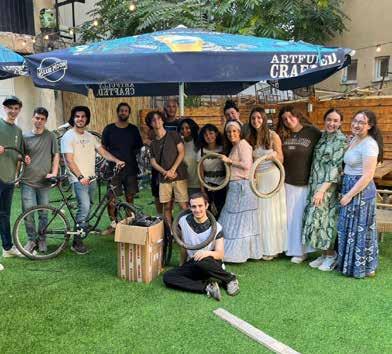
we have always brought multiple trips of young people to experience Israel. In fact every single year for the last 32 years, we have facilitated Jewish journeys for hundreds of young Jews and we shall always continue doing so. However, we also recognised there are other places in the world where you can create a very
powerful Jewish experience and if sadly, young British Jews may be reticent to travel to Israel, we, as an educational organisation are obligated to create an alternative. In the late 90’s we launched educational trips to Poland; come the Intifada we created powerful Jewish journeys to alternative destinations in the Diaspora. These trips proved to be highly effective too.
The Talmud draws a distinction between seeing and hearing, saying that they are simply incomparable; one cannot compare reading or hearing about a historical event to actually standing on the ground where it took place, touching the very stones, breathing in the air and taking in the scenery whilst hearing an account of the events that happened there. Simply hearing events without that backdrop means that the mind needs to work far harder to appreciate and remember the lessons learnt.
We have spent the last thirty years developing and refining these ideas both in theory and practice, for Jews of all
ages, backgrounds and across the Jewish spectrum.
It is a tremendous privilege to be able to provide tried, tested and proven solutions to the challenges facing Jewish continuity. It is with a tremendous sense of pride and gratitude that we can say with confidence that the thousands of participants of immersive experiences through various Jewish Futures initiatives - FJL, GIFT and JRoots journeys, have emerged with an increased appreciation not only of the world that was but also inspired and empowered to play their part in forging a brighter Jewish future.
GIFT has initiated several volunteering missions in Israel, especially since October 7th, 2023, and is currently on its second life-changing trek up Mount Kilimanjaro. These trips allow participants to experience giving first-hand, reinforcing the idea that doing is more powerful than just talking about giving. Similarly, Shelanu has been engaging with Israelis living in London, fostering a sense of community and organising various trips, including a recent ski trip for Israelis living in London as well as Nova Survivors. These trips not only provided respite but also facilitated meaningful discussions on spiritual and Jewish issues.
The Forum for Jewish Leadership (FJL) has been taking the young Jewish leaders of tomorrow to New York, Washington, Israel and the UK for internship opportunities and Jewish learning experiences for over 15 years. These trips have been invaluable to shaping these young people in their careers and their Judaism, offering an entirely unique perspective that
combines valuable work experience with Jewish learning opportunities. FJL organises internships for aspiring young Jewish leaders, introducing them to influencers and leaders in their workplace environments, thereby providing a powerful immersive experience.
Chazon also engages with trips, taking Jewish students from orthodox communities to places such as York, Poland, Germany, Budapest and many more. These trips offer the students opportunities to explore their Jewish heritage, while allowing them to ask key questions on Jewish life and practise with world-renowned Rabbis and educators.
In summation, Jewish Futures has created a platform and infrastructure that can provide the most powerful, enduring and impactful educational experiences on offer in the world today facilitating such journeys for thousands of young Jews each year. JROOTS exists as an organisation to facilitate, partner and empower other organisations such as schools, movements and communities to harness the power of the immersive Jewish travel experience for themselves, their agenda and the growth of their constituents. As a community, we need to continue to think creatively how to innovate and discover ever more pathways that will lead to an ever more empowered, engaged and committed young Jewish community. They shall form our Jewish Future.
Rabbi Naftali Schiff is Founder and Chief Executive of the Family of Jewish Futures
Residents thoroughly enjoyed a special Russian-themed cultural activity led by Emily Ben - Ze’ev from “Emily’s Adventures in Wonderland”. There were Russian , Yiddish and Jewish songs played on the clarinet, Russian costumes and a large collection of Russian Matryoshka dolls for residents to look at. And of course a shot of

Thirty cyclists, including three men supported by Kisharon Langdon, completed the 284-mile Kisharon Langdon Velo bike ride from Liverpool Street Station to Amsterdam.
Participants raised £70,000 for the charity with donations still coming in. This ride marks the first major event as a merged organisation and has exceeded its fundraising goal.
Riders went through France, Belgium and the Netherlands retracing the historic Kindertransport route.
The challenge passed the Kindertransport statue at Liverpool Street Station, Channel Crossing to Life memorial sculpture at the Hook of Holland and an escape point for Jewish children from Nazi-occupied Europe to the UK.
The itinerary included London-Folkestone-Dunkirk (approx. 80 miles), Dunkirk-Vlissingen (approx. 75 miles), Vlissingen-Den Haag (approx. 80 miles), Den Haag–Amsterdam–London (cycle approx. 45 miles).
Dieter Stein and Lee Clements piloted cyclists Marc, Ted, and James on an extraordinary journey. The ride highlighted the unique challenges and rewards of tandem cycling.
“Sitting at the front of a tandem requires strength, coordination, trust and many hours of practice,” said Stein. “Your sense of balance is different, and if one pedals without the other, you get bruised and bloody calves or shins. As for your turning circle, it’s like an oil tanker!”
The physical demands as substantial as tandems are heavier than single bikes, often requiring pilots to pedal for two.
“When cycling alone, you stand up to push harder when going uphill, but that’s impossible on a tandem,” Dieter added. Despite the arduous task ahead, the camaraderie made the effort worthwhile.
“It is so rewarding,” said Dieter.
Michael Marlowe participating in his fifth ride, added: “Our daughter Natasha has been in assisted living in KL for almost a year, the changes we have seen in her have been quite remarkable. One of the cyclists, Clive Nathan, said kaddish not only for our son Jake who was murdered at the Nova site , but for his late mother and also for relatives of Paul and Dieter opposite the Kindertransport statute in Holland. It was quite the ride” Marc, 42, a cyclist on previous events to Vienna, France, Wales and Italy, expressed his excitement about the journey, noting, “What I enjoy most is the camaraderie.”
Emma Nagli, Fundraising Manager at Kisharon Langdon, said: “The commitment and enthusiasm shown by all the cyclists, especially those with learning disabilities, is truly inspiring. Their hard work and perseverance have made this event a tremendous success, not just in terms of fundraising but also in building a strong, supportive community.”
Velo organiser Lynne Gilbert, whose nephew Daniel is supported by Kisharon Langdon, emphasised the non-competitive nature of the event.
“Our velo events aren’t races. Cyclists meet Kisharon Langdon members, form friendships, and get to know the charity. It’s a very positive experience.”

The Reception class of Beit Shvidler in Edgware recently celebrated receiving their first Siddur in a heart warming and joyous event. Beit Shvidler recently underwent a Kodesh inspection and achieved an Outstanding grade in all areas. The inspectors praised the school’s “warm and caring atmosphere,” noting that pupils receive “an inspiring and holistic Kodesh education” with a curriculum that offers “memorable experiences and rich opportunities for high-quality learning for all pupils.”
reading carefully and gaining accuracy whilst reading from a Siddur. We are so proud of their wonderful achievement! The children hosted a memorable Simchas HaSiddur, where they sang beautifully in front of a packed hall of parents, grandparents, and other delighted guests.

The learning of Hebrew reading and Chumash was highlighted as being of an “extremely high standard.”
The Reception children have worked hard to learn all the letters and vowels, and after much practice, they are now
Following their performance, the children demonstrated their reading skills by reciting parts from Yigdal. The event was highlighted by an inspiring address from the school principal, Rabbi Z.H. Lieberman, before each child was presented with their very first Siddur.
A big Mazel Tov to the Reception class of Beit Shvidler!
Broughton Jewish Cassel Fox primary School year 1 Boys recieved their new Siddurim at a Mesiba in school. The boys are extremely excited and proud to use them.














The London School of Jewish Studies is a great option for a career in teaching. LSJS has a friendly, local campus with experienced, dedicated staff. The organisation has been training teachers for over 30 years and offers a range of courses for primary and secondary schools. LSJS provides two routes to train as a primary school teacher. The secondary school programme offers a range of subjects to specialise in including Geography, Maths, Jewish Studies and History.
Sarah Joffe qualified as a History teacher through LSJS on the School Direct Secondary programme in 2023.
Teaching was in the back of Sarah’s mind from a young age as her mother was a teacher. And it was during university she realised it was her vocation. Now in her second year as a History teacher at Hasmonean High School for Girls, Sarah will be subject leader for history at the boys and girls school from September.
She said: “I love the subject, the school and the girls, I’m happy with every element of my role.”
Looking back on her teaching path, Sarah said: “During my degree we could choose our studies, I focused on history as well as cognitive psychology and politics. I particularly focused on the history of education. Towards the end of my degree, I looked into the Teach First qualification (a 2-year teacher training programme that focusses on helping
pupils affected by poverty), but that was for primary school teachers which wasn’t for me.
“Before I qualified as a teacher, I gained experience in the classroom, which forced me to get to grips with behaviour management and become super organised. I needed the training that comes with a qualification, so contacted LSJS. They had different routes, the one which suited me was School Direct as I would get to spend 80% of my time in a classroom from day one.”
Why did you choose LSJS rather than a traditional university route?
“If I’d done a PGCE at a mainstream university, I would have spent only a fraction of my time in the classroom, it would have been much less practical. Teaching is a vocational profession, you need to learn it by being in the classroom. Doing a PGCE at a mainstream university would have been more like spending another year at university, LSJS Teacher Training enabled me to start my career while I qualified.
“My experience at LSJS was so personalised, it was a relaxed atmosphere. You get what you need from the course, the training was on a high level. I really wanted to study what was specific to my subject. I had a one-to-one mentor who was amazing and highly personalised. LSJS gave me the opportunity to get a qualification; I wouldn’t have been
able to do it anywhere else. Today, I can honestly say that I use everything from my LSJS training. I learnt to build a rapport with colleagues, to be organised and manage my work load, as well as gaining hands on experience. It’s also been great for my employment prospects. It’s easy to use LSJS training as a springboard to get a job.
“I love a good debate, so welcome students in my lessons ask interesting questions. It’s lovely to see the inquisitiveness. Fortunately, my students have that curiosity and ask fantastic questions across the board, so it’s not just about feeding the students the information on the curriculum.
“In my generation, and in older generations, far too many people have negative recollections of their experiences at school. History is stories about people’s lives and I want my students to enjoy that. Are the girls having a nice time? We study exam technique but I try not to make that the focus. I try to make sure they are enjoying school and their education.
“My top piece of advice to other trainee teachers is to take nothing personally. You’re the adult in the room. If you’re an aspiring teacher
who’s in university get into the classroom, get involved, get work experience. The School Direct course at LSJS gives you that experience. I benefitted so much from it. Also, observe as much as you can, go and find great teachers and watch them. And get involved in your local youth group. When you’re in it, you just know it’s the right profession for you.”
Whether you are a recent graduate or looking for a mid-life career change, LSJS provides the right course for Qualified Teacher Status (QTS). Details: www.lsjs. ac.uk or 020 8203 6427.


2-week intensive course
Monday 29 July –
Thursday 8 August
10AM–1PM with a coffee break


BY ADAM MOSES
AJEX JMA celebrated 80 years of Heroism at the National Memorial Arboretum in Staffordshire during Armed Forces Week.
Eighty people took part in a special ceremony to underscore the contributions of Jewish communities to HM Armed Forces. D-Day veterans Mervyn Kersh and Stanley Fisher laid a wreath on the 80th anniversary of the D-Day landings.
Mervyn and Stanley, both 99, have been part of AJEX for decades. Wreaths were also laid for Operation Market Garden, the Battle of Monte Cassino and battles of Kohima and Imphal in Burma.
Participants included veterans, serving personnel, British military representatives, community leaders and AJEX members. Proceedings were led by Dan Fox, AJEX National Chair, Rabbi Major Reuben Livingstone officiated the ceremony supported by Rabbi David Singer, Rabbi Yossi Jacobs and Michael Wegier from the Board of Deputies. The Exhortation was read by AJEX Vice Chair Mike Bluestone and the Kohima Epitaph by veteran Joe Silver.
As well as the D-Day veterans, wreaths were laid by Alexander Barker from 101 Squadron, Brigadier Christopher Coles, Lt Col Danny Yank, Clive Boxer and Brigadier Simon Goldstein.
Steve Pack, AJEX Trustee, Fiona Palmer, Chief Executive, and Lucy Godfrey delivered readings during the ceremony. They were followed by Lynn Kersh sharing a poem written by Mervyn.
The ceremony concluded with a L’chaim toast to honour those who served and continue to serve HM Armed Forces.
Following formal proceedings, attendees joined talks at NMA Memorials.
Fox spoke at the Normandy Veterans Memorial, Ron Shelley at The National Armed Forces Memorial and Alexander Barker at the 101 Squadron Memorial.
Speaking after the ceremony, Fox, said, “We gathered not only to remember but to honour the brave Jewish men and women who served their country with courage and distinction. Seeing Mervyn and Stanley laying the wreaths together was very moving.”
two 99-year-old veterans who were there was incredibly poignant. The emotion was palpable, especially under the blazing sun and witnessing Stanley’s great-granddaughter lay a posy in front of generations of her family was very touching. The day was a powerful reminder of the legacy and sacrifices of our community. We must never forget their legacy.”
She added: “With the rise in
antisemitism across the UK we continue to show our immense pride in our Veterans’ contribution to British society.
This year’s event is one of many aspects of AJEX’s work in education, remembrance, welfare and combatting antisemitism.”


SUNDAY 7 JULY : SHACHARIS 8 :30AM BREAKFAST 9:30AM


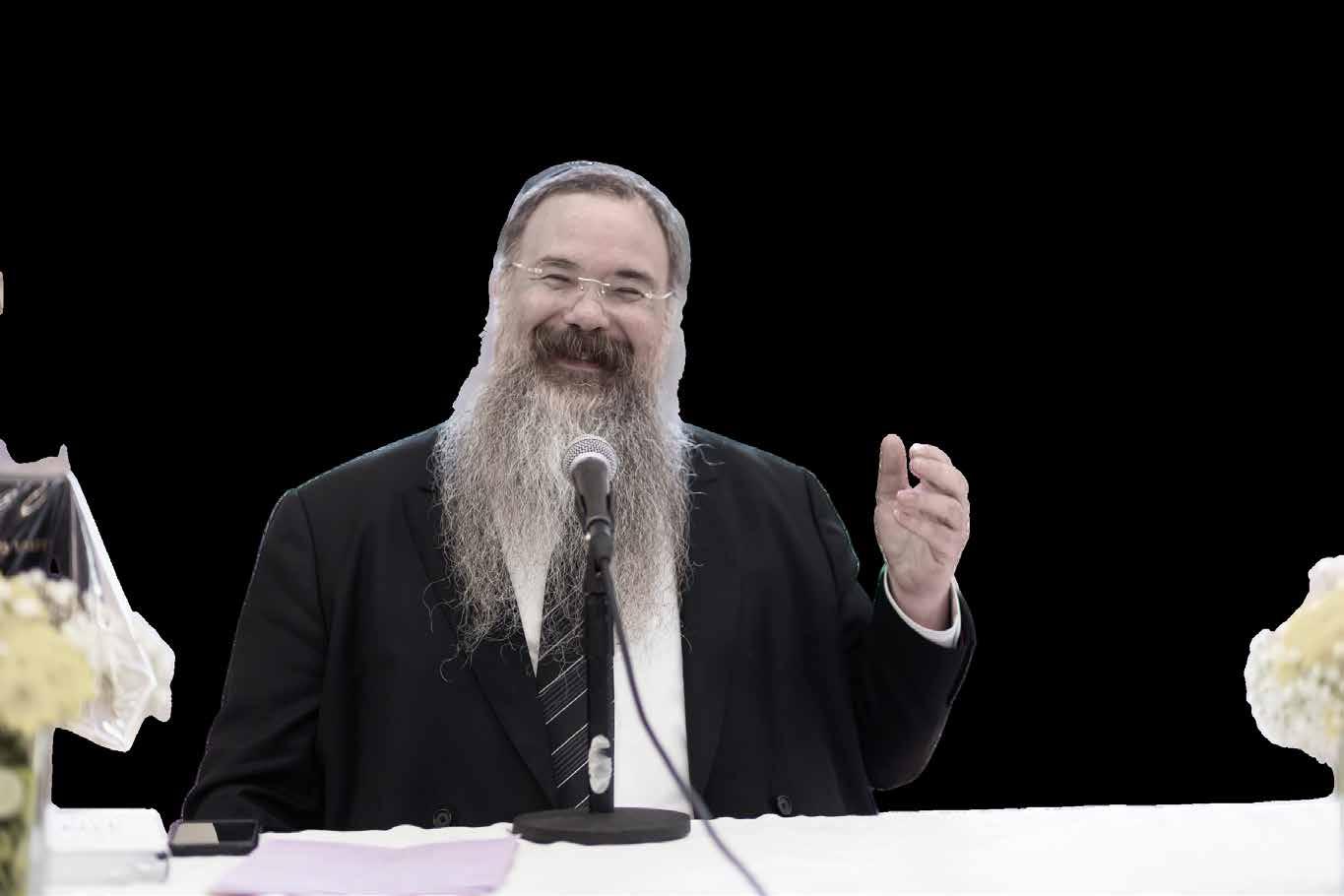
Palmer noted, “This year’s ceremony was one of the most special we’ve ever had. Commemorating the 80th anniversary of D-Day with





14 - 28 JULY
* From only £99, flights included. T&C's apply. Ages 19-23


BY RAV BINNY FREEDMAN
This week’s portion of Korach, contains a valuable lesson in overcoming and resolving conflict.
Korach, a cousin of Moshe with leadership qualities, has a penchant for cynical politics. He mounts a rebellion that nearly results in the destruction of the Jewish people. Moshe proposes a solution: let all those who would desire the priestly leadership offer up incense in the morning, and allow G-d to make clear who is indeed chosen. Although this proposal seems a healthy way to resolve the conflict, something goes wrong. Korach spends the night (see Rashi, Bamidbar 16:19) recruiting the people to his cause, subsequently gathering the entire congregation against Moshe and Aharon.
At this point G-d intervenes and in fulfillment of Moshe’s prediction brings an earthquake causing the earth to open up and swallow Korach and those closest to him entirely. Then, the rest of the followers from the tribe of Reuven who
offered up incense that morning were consumed by a heavenly fire (Bamidbar 16:1–35).
With the rebels completely annihilated by the hand of G-d this story should be over, right?
Yet the story does not end here. The next morning, the people are still upset, and are still challenging Moshe and Aharon’s leadership! How could they still harbor any doubts after seeing G-d’s hand weigh in so obviously? At this point one might have expected G-d to open up the earth again or bring down the same all-consuming heavenly fire, yet this time, G-d’s offers a completely different path to resolve this rebellion:
G-d tells Moshe to gather the leaders of the shevatim all of whom will bring their staffs and place them before the Tent of Meeting and in the morning a miracle occurred and the staff of Aharon flowered with almond blossoms, thus demonstrating that Aharon was chosen by G-d as the High Priest which finally quelled the rebellion and resolved the conflict (Bamidbar 17:1–28).
And one wonders: why wasn’t an earthquake enough to make the point?
Perhaps the Torah is sharing with us a fundamental lesson regarding conflict resolution: Conflicts are never resolved by force alone; it is only with dialogue and inclusion that we really move past our battles and struggles.
This is not to say that force and even war have no place; sometimes they are necessary. But we should never delude ourselves into thinking we have resolved the issue simply by winning the day.
As an example, peace has reigned in Europe for the past seventy-five years because the Allies not only won World War II but also resolved the conflict which needed mediation and dialogue.
In this writer’s opinion, Anwar Sadat finally realized we had won the war, so he brought Egypt to the table and we have had peace with Egypt for almost fifty years. King Hussein of Jordan came to the same conclusion and we have had peace with Jordan for thirty years. And while there is much room for improvement in both those peace treaties, there is much

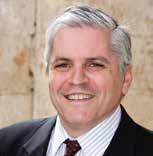
to be thankful for as well.
This is not to say such conflict resolution is impossible without force; if both sides want to find peace it is possible, but I can’t think of a conflict where that was accomplished without force first prevailing.
And it goes without saying that this is equally true on a personal level. No conflict will ever be resolved, much less end up with a healthy outcome by force alone. Beating up a bully never solves the issue; nor does kicking a child out of class, or imposing a solution on a child without any discussion. But force can get the parties to the table for that healthy discussion if employed in the right fashion.
Something to think about… Shabbat Shalom from Jerusalem.
Rabbi Binny Freedman is Rosh Yeshiva of Yeshivat Orayta. He is a member of the Mizrachi Speakers Bureau (www.mizrachi.org/speakers).

BY SIVAN RAHAV MEIR - TRANSLATED BY YEHOSHUA SISKIN, JANINE MULLER SHERR
THE REALITY OUTSIDE VS. THE REALISY INSIDE
Last week’s headlines featured a violent attack against a synagogue in LA, with strong condemnations issued by the mayor, the governor, and even President
shouting: “From the River to the Sea,” in other words, that Jews have no right to live in Israel.
“What happened outside the synagogue is precisely why so many people are making plans to move to Israel,” said Katz. “I witnessed how this alarming rise in anti-Semitism has yielded an unintentional, positive result, strengthening our presence in the Land of Israel.”

Biden.
Gidon Katz, CEO of IMP (International Marketing & Promotion), provided me with a different perspective on the story. Katz, together with his partner Emanuel Vatari, organizes periodic real estate fairs in the Diaspora for people interested in making Aliyah. Since Simchat Torah, the demand for these fairs has peaked, with recent events occurring in New Jersey, Flatbush, the Five Towns, Montreal, Toronto, and last week, in Los Angeles. Without minimizing the severity of the attack, Katz believes that it is secondary to the main story: the event itself. Katz pointed out that we need to pay attention to the focus of these angry protests. “While a violent crowd was screaming outside, more than 350 Jews were gathered inside the synagogue. Young people, adults and heads of families flocked here, seeking to purchase homes throughout Israel, thereby reinforcing what was said in last week’s parashah: ’The Land is very, very good.’ Through their actions, they are repairing the sin of the Spies. Thousands of years after leaving Egypt, they are now choosing to leave the US and to make Aliyah.”
Many participants braved the riots to reach the event venue, facing curses and actual physical assaults by the protesters, while others were able to get in through the back door. The Hamas demonstrators were very clear about their intent,
In this week’s Torah portion, Korach, we read about the contentious dispute led by Korach against Moshe Rabeinu and Aharon HaKohen. Driven by intense jealousy, Korach coveted their esteemed positions. The dramatic punishment that Korach and his followers received – the earth swallowing them whole – serves as a powerful symbol: envy leads nowhere but to self-destructions, consuming a person entirely. Our Sages encapsulated their fate with a profound statement: “Envy, lust, and the pursuit of honor remove a person from this world.” Envy is not merely a negative trait; it is catastrophic. It is not something one can live with.
So, what is the remedy?
The Sages say, “Who is rich? He who is content with his lot.” True wealth lies in gratitude for what one has, recognizing and appreciating the good in one’s life without succumbing to jealousy of others. This is a lifelong endeavor, especially in today’s era of social media where ostentation is glorified.
If envy removes us from the world, surely an attitude of contentment and gratitude infuses us with greater vitality. May we embrace this important lesson and live richer, more fulfilling lives.
During my recent trip to New York, I met TV host, NBA reporter and Israel
activist Emily Austin. When I asked for her takeaway after 9 months of hasbara, PR on behalf of Israel that she sent to her 2.3 million followers on social media, she remarked, “I see a lot of unity, a lot of reunited Jews. [Before October 7] we were all in our separate worlds. This was a reminder that ultimately, we need to stick together, stay together, love one another. They say “B’yachad nenatzeiach,” (together we will win), and it’s true.”

with great joy and exuberance.”
Noy Zafrani, the fiancée of Yuval Revia, was murdered on Simchat Torah together with him and his brother, Noam at the entrance to Kibbutz Nir Oz. If you haven’t

heard of these young people among the many victims, it’s because of the enormity of the evil that was perpetrated against us.

Noy’s sister, Maor Shaked, describes her sister: “Noy felt very connected to the Land of Israel. She grew up in the rural community of Nokdim and loved to travel around the country. She knew all the songs of the Land of Israel by heart, and in honor of her Bat Mitzvah, our grandmother wrote out all the lyrics and arranged them in a special binder for her. Every Shabbat, Noy and I would sing love songs to our beautiful country
In last week’s parashah, Shelach, we read about the spies who came back with a negative report about the Land of Israel. Since then, our nation has been haunted by this sin and we continue to grapple how to view our reality – with faith and optimism, or with despair and hopelessness.
Maor related that last year, during the week when we read the story of the spies, she attended a special evening organized by the Buzaglo family, where people heard speeches and songs in praise of the Land.
“I enjoyed it so much that I decided to hold a similar celebration the next year, in the hope that this custom would catch on in other places as well.”
This year, before the week of Shelach, Maor related that she was ambivalent, given the tragedy that occurred. “In the end, I decided to go ahead with my plans. I didn’t want to repeat the mistake of the ten spies! I don’t view this country merely through the prism of politics and the latest news; our country is very good.
“This year, our land is saturated with the blood of my sister and of so many of our precious people, but that only strengthened our resolve to protect and love our land, and to believe that the chaos we are witnessing now will come to an end.”
Want to read more by Sivan Rahav Meir? Google The Daily Thought or visit sivanrahavmeir.com
BY RABBI MOSHE TARAGIN
July 4th is an annual celebration of democracy. In the modern era, democracies have supplanted oppressive forms of government, protected individual rights, and liberated the human spirit. Affording every citizen political and economic freedom, democracy has unleashed immense human potential generating a modern world of progress and expansion.
The United States is the greatest democracy of the modern era. It began as a “city on a hill” meant to showcase democratic principles of government. Not only did the United States launch this experiment but additionally, in the 20th century, it courageously defended democracy against the threat of totalitarianism and Communism. Though July 4th is an American holiday, in a larger sense, it celebrates the general spread of democracy.
American Jews in particular, have a lot to celebrate. Jewish life in America has blossomed with unprecedented vigor. For the first time in our exile, we don’t inhabit the margins of society as strangers, but have become deeply and organically incorporated within the fabric of our host country. Jewish success in America is not to be taken for granted and July 4th both commemorates these historic achievements and offers an opportunity to express gratitude to America.
July 4th is also a day to consider the failings of modern democracy and the perils for religion and for religious values. By stressing the individual over the collective, modern society has glorified personal choice and personal expression. National, communal, or collective identities which preach traditional values have become disregarded. Without strong communal or national identity, traditional values such as family and morality erode. The cultural melting pot of America encourages people to quietly disappear into a faceless suburban landscape.
July 4th is a day to appreciate democracy, to celebrate Jewish life in America, and also, to ponder the moral challenges which democracy poses.
This year though, July 4th is different. This year’s July 4th is a point of inflection for the American Jewish community. October 7th and the ensuing eight months shattered previously held notions of Jewish life in America, transforming a once confident community into one grappling with renewed vulnerability. A community that felt embraced and embedded faced resurgent and rabid antisemitism which cast them as outsiders, challenging their sense of acceptance and security in a land they once viewed as their home. American society appeared to be tolerant and respectful, but it became quickly evident that antisemitism always simmered
beneath the surface. The landscape has shifted for American Jews.
For many, this has been a devastating blow, one which ruptured their identity. For many Jews, the crusade for social justice is a keystone of Jewish identity. Many American Jews viewed themselves as equal partners in this lofty calling to craft a better society of equality and tolerance. Watching so many of their presumed partners turn their backs on the Jews shattered their conceptions of American society. Other Jews who were more culturally insulated felt less betrayed by the surfacing of antisemitism. Their Jewish identity was less centered upon a partnership with the broader society as they viewed themselves as less integrated within the general culture.
Either way, for American Jews across the ideological spectrum, October 7th was seismic shift in how they perceive Jewish life in America.
This is a cognitive moment for American Jews. It is a moment of collective awakening and of shifting identity. It is difficult to predict the future. At some
expulsion a hundred years later. The violent pogroms against Russian Jews in the 1880’s awakened us to our own helplessness and launched the first stages of what would become mass emigration to the West. Hitler’s rise to power in 1933 and the Nuremberg laws enact ed in 1935 signaled that Berlin wasn’t little Jerusalem. These were similar cognitive moments in Jewish history when we realized our life in exile would no longer be peaceful.
The United States of 2024 is very different. Though Jews face vitriol and hate, by and large, antisemitism hasn’t infiltrated the government. It is very easy to strike comparisons with Germa ny, but the situation in America is still very different and we hope it remains that way. Despite our valuing of Aliyah, every Jew should wish well-being for every other Jew, no matter where they live. The war and its aftermath highlighted just how co-dependent Israel and the American Jewish community are. Hopefully, life in America remains tranquil
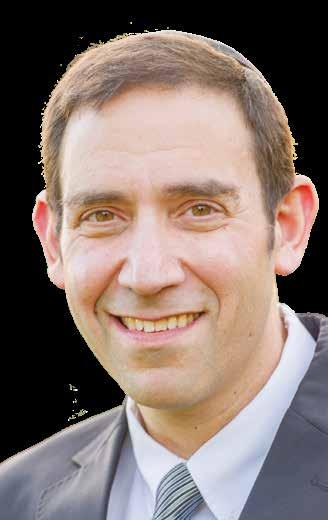

point, as it has been in every country we lived in throughout history, the American Jewish experience will come to a close. The final terminus for the Jewish people is our collective homeland.
Some Israelis wish that life in America becomes less secure for Jews, to encourage more rapid Aliyah. I am uncomfortable wishing discomfort or antisemitism upon any Jew, regardless of where they live and independent of whether it inspires their return to Israel. Such calculations are better left to Hashem.
But this year has certainly been a turning point. Throughout Jewish history there were similar “turning points”, during which it became evident that we were no longer fully welcome in our host country. The 1391 Massacres in Spain had a profound and devastating impact on Jewish life and foreshadowed our tragic
and successful.
It is undeniable though, that the war has forced American Jews to reconsider their attitudes toward Israel. This recalibration is healthy and important. It is fair to say that some American Jews had become too comfortable in America, took Israel for granted, and didn’t properly incorporate Israel into their Jewish identity. The past year has reminded every Jew that no Jew will ever be fully safe without the Jewish state. For American Jews, this year’s July 4th is a day to adjust their relationship with America, a country that has offered us so much, but can never be called “home”.
While pondering the American Jewish experience, it is also crucial to appreciate the impact and influence of Jews upon America. Over the past 150 years Jews have propelled the United States to prominence as a world leader. In
diverse fields ranging from academia and medicine to business and the arts, Jews left an indelible mark on the fabric of American society, contributing profoundly to its intellectual, cultural and economic vitality. This is our legacy – to bring prosperity and welfare to humanity. This has also been our history. Almost every country which warmly embraced Jews, experienced growth and progress. After expelling us, they suffered a steep decline.
Jews helped advance Europe to its golden age in the 19th and early 20th century. Tragically, Hitler brought a murderous end to mass Jewish presence in central Europe, and this region has never recovered its past glory. A similar fate befell Russia. Twice in a span of a century Russia hounded the Jews. The Tzarists regimes of the 19th century institutionalized a series of discriminatory decrees meant to harass and persecute us. In the 20th century, through mass executions and forced deportations, Stalin attempted to purge Communist Russia of its Jews. Russia still hasn’t recovered.
Hashem told Avraham that he will be beracha for other nations, and we have dutifully served this mission, supporting and praying for local governments while improving the surrounding society. We have brought values, spirit, and innovation to the American experiment and we should be proud of this accomplishment. We hope though, that America won’t suffer the fate of other countries who ousted its Jews.
Until every Jew returns home, we continue to bring prosperity to all those who will accept it and embrace us.
The writer is a rabbi at the hesder Yeshivat Har Etzion/Gush, with ordination from Yeshiva University and a master’s in English literature from CUNY. He is the author of Dark Clouds Above, Faith Below (Kodesh Press), which provides religious responses to Oct. 7.


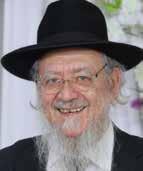
BY RABBI YAKOV SCHONBERG
A baraisa on Bava Basra 8b teaches that contributions to the kupa shel tzedakah are collected by two people and the funds are distributed by three people. The baraisa explains that two people are needed to establish an authority over the public, but distribution requires the equivalent of a Beis Din to assess eligible circumstances, and therefore three persons are required. The gemora later seeks to clarify what is meant by establishing an authority over the public. Since every resident was required to donate to the fund, in what way did the collectors exercise authority? The gemora answers that the collectors were empowered to seize a pledge for unpaid charity obligations. The gemora accepts that it is forbidden to force people to give charity if they cannot afford it, but where the donor is comfortable financially and he has not contributed as much as he is capable of giving, then collectors may seize a mashkon to secure payment. The case of Rava is then quoted where he coerced R’ Nassan, a wealthy individual, to give a donation of four hundred zuzim - an enormous amount. Our discussion will focus on the contradictory concepts of willing donations and enforced charity obligations.
As an aside, it is interesting to note the frequent use of the number 400 throughout the Talmud. Arabic numerals that we use are a comparatively late invention and in the Torah numbers are always expressed with words. However, for general counting each letter of the Hebrew alphabet is designated a number, so that 1-9 and 10-90 are allocated to the first 18 letters, leaving the last four letters for the hundreds, with taf equivalent to 400. The last letter of the alphabet equivalent to 400 conceptualizes the greatest imaginable quantity, somewhat similar to the English ‘million’ – as in ‘thanks a million!’, without intending a quantified number. Similarly, the number 300 is often used to indicate a large, but not the largest quantity, the penultimate letter being one step down.
Tosafos raises a problem. The principle of compelling performance of positive
mitzvos is well established in Kesubos 86a – refusal to do mitzvas lulav or succah may be physically enforced with malkos even to the point of death. However, Chullin 110 notes that there is one category of positive mitzvos that cannot be enforced: those mitzvos where the Torah records their reward, ןרכש ןתמ םדצב. The example in Chullin is בא דובכ םאו, honouring parents, which cannot be enforced because the Torah explicitly promises long life for complying with this mitzva. Tosafos asks how could Rava compel R’ Nassan to donate, since the Torah confers blessings in connection with tzedakahh –
and since the Torah promises reward, Beis Din should not have the right to enforce this positive mitzvah. Tosafos provides four answers. Rabbeinu Tam first suggests that Rava did not physically coerce the donation but used verbal persuasion to convince R’ Nassan to donate. Alternatively, Rabbeinu Tam proposes that the city had fixed civic obligations which can be physically enforced as a social and municipal responsibility, besides the mitzvah of tzedakah. Ri resolves the problem by claiming that aside from the positive mitzva of tzedakahh, there are two negative mitzvos –
אל ץופקת, do not stiffen your heart nor withdraw your hand, and enforcement is appropriate for the lavim themselves. Finally, Ritzba takes a different approach saying that the limitation on Beis Din is that they are not obligated to enforce, but they have the option to do so if they wish.
Rambam (Matnos Aniyim-7:10) rules that where someone does not wish to donate according to his ability, Beis Din must utilise physical pressure until he pays the amount they have assessed he should be giving, and if he is present, they may seize a pledge to guarantee payment. Shulchan Aruch (YD-248:1) paskens accordingly. The question arises, whilst this fits well with Rava’s enforcement, how does Rambam address the question that one cannot enforce a mitzva where the Torah guarantees its reward. None of Tosafos’ answers can work. The answer that Rava pressurised verbally is countered by Rambam expressly stating that one can use malkos. The second answer that the obligations had been previously fixed is not compatible with Rambam’s description of one who does not wish to donate according to his ability. Ri’s answer that we are talking about enforcing lavim aside from the asey also does not fit, as lavim can be enforced by
anyone and it does not require Beis Din as stated by Rambam. Finally, Ritzba’s answer that Beis Din can enforce if they wish does not fit with Rambam’s obligation for Beis Din to act. How can Rambam resolve the question that enforcement is not applicable to positive mitzvos with guaranteed reward?
Ritva claims that the mitzva of tzedakah is an exception to mitzvos which guarantee reward because it services the needs of poor people. His argument would appear to be that besides being a mitzva incumbent on the individual, it also imposes a monetary obligation to satisfy the needs of the poor and it is the financial component that is being enforced. Radvaz poses Tosafos’ question and explains that according to Rambam the combination of the positive mitzvah together with the lavim creates a personal obligation akin to financial indebtedness which attracts enforcement. He then adds support for this innovative approach by pointing to a special feature associated with tzedakah. Normally one is not allowed to challenge Hashem to prove that one is rewarded for one’s mitzvos. Radvaz says that Hashem accepts such a challenge in connection with maaser as it says: תאזב
He adds that one is likewise allowed to test Hashem for tzedakah. How does Radvaz resolve Tosafos’ enforcement problem with this special characteristic of tzedakah that one may test Hashem?
Let us consider the underlying reason why positive mitzvos linked to reward in the Torah should not be enforceable by Beis Din. Rashi in Chullin explains that the promise of reward acts as a warning that if one does not do the mitzva, the punishment is loss of this reward. In other words, the incentive of reward should be sufficient to convince the person to do the mitzva and no pressure from Beis Din is necessary. Teshuvos Maharik 148 quotes the opinion of Rabbeinu Eliyahu who limits the principle of linked reward to eternal reward, where the Torah promises arichas yomim, which is explained to refer to reward in olam habo rather than in this world. Since the blessing of tzedakah relates to reward in this world, it is not subject to that principle, and it is left to Beis Din to enforce. Why should it make a difference whether the reward is in this world or the next? Reward in this world is

very different from eternal reward. Reward in olam habo is the natural outcome of doing mitzvos and is guaranteed, so knowledge of reward in olam habo should be sufficient incentive to convince a person to perform a mitzva like kibud av. It is under the control of the Heavenly court and Beis Din should not get involved. However, where the reward is in this world, as is the case with tzedakah, it is difficult to discern that one is receiving reward at all, as it takes the form of natural outcome of our actions. The reward is not a miraculous result of the mitzva, so it is not sufficient incentive to ensure that the person complies with his obligation to give tzedakah. People may not always realise that the source of their wealth is reward for their mitzvos and can attribute it to their own abilities. This is no longer a purely spiritual reward which belongs to the Heavenly court and reverts to enforcement by the earthly court. We are now able to understand what Radvaz meant that being able to test Hashem was proof that Beis Din could enforce tzedakah as ruled by Rambam. Testing means that one recognizes that the reward is the result of his actions in this world and that differentiates tzedakah from kibud av, where eternal arichas yomim is promised.
We still need to understand how there can be any reward for a mitzva done unwillingly – has he not transgressed the prohibition of ‘stiffening one’s heart’? The answer is the same as in the case of pressurizing someone to give a get, because ultimately, he truly does want to give it. Deep down a person appreciates the need to give tzedakah, but sometimes he needs that extra push to overcome his attachment to his money. On the other hand, where a donor truly cannot afford to give, it would be forbidden to pressurize him, as that may be considered stealing basic sustenance from his family. That needs careful assessment, which requires charity collection by two people.
Rabbi Schonberg was born in London in 1948 and attended Hasmonean School. He attended Manchester, Chaye Olam and Gateshead Yeshivos. He qualified as a Chartered Accountant in 1972 becoming a partner at Cohen Arnold.
To contact Rabbi Schonberg, please email, yschonberg@gmail.com
To find out more, you can sign up at mercazdafyomi.com and receive a free gemoroh.

Dear Rabbi
I would just like your opinion whether Rabbis should occasionally bend the rules and turn a blind eye depending on the circumstances!
I find today the Rabbis are far friendlier and understanding than the old school some of whom who on a lot of occasions were totally unapproachable!
Thirty odd years ago my son had a Bar Mitzvah. His great-grandmother who was about 90 years old at the time and who could hardly walk, decided she would like to be there as it was likely to be her last. She arranged for a car to take her to Shul. One of the very “pleasant” members of the congregation told the Rabbi who embarrassed us in front of the congregation and castigated our family.
Needless to say we left that Shul and joined another with a much kinder more approachable Rabbi. Surely G-d would be happier for her to be there than not.
Dan
Dear Dan
There are two parts to your question
with one answer. The first is whether Rabbis should bend the rules. The second is what would G-d want? The answer to both is that G-d would not want Rabbis to bend the rules. That said, G-d would not Rabbis to embarrass their congregants and castigate them in front of the community either.
Here’s the thing: “The end hallows the means” is a pagan concept, not a Jewish one. Robin Hood (who stole from the rich to give to the poor) is not a Jewish role model. So, when people ask the question, “Am I better off driving to shul so that I can be there to pray rather than staying at home,” the answer is unequivocally the latter. G-d accepts prayer everywhere and anywhere and He would rather your prayers without the Halachic compromises. You can argue “but it meant everything to Great Grandma to be there,” as I am sure it did. But religion is about what G-d wants rather than what we want. Sometimes that involves sacrifice, big and small along the way.
That said, I find it wholly absurd that anyone would feel the need to inform the rabbi and more so, that the rabbi would feel the need to make public comments about it. To be frank, the rabbi’s public

embarrassment of your family is a sin no less, possibly more, than the Shabbat violation.
It is often said, there are five volumes to the “Code of Jewish Law.” Even as there are in fact only four, the fifth being common sense.
Many, many years ago I gave a sermon in shul about the theme of “ends hallowing means.” It prompted a member to call me after Shabbat: “Rabbi I live 2.5 miles from the synagogue. If I understand you correctly you’re telling me I am better off praying at home rather than driving as I do.” I replied, “Cecil, how you get to synagogue is none of my business. I don’t ask, I don’t second guess and I don’t judge. But if you’re going to ask me point blank which is the better of the two, then I have to tell you that staying and praying at home is the better option.” The following week and every week thereafter since, he left earlier and made the walk.
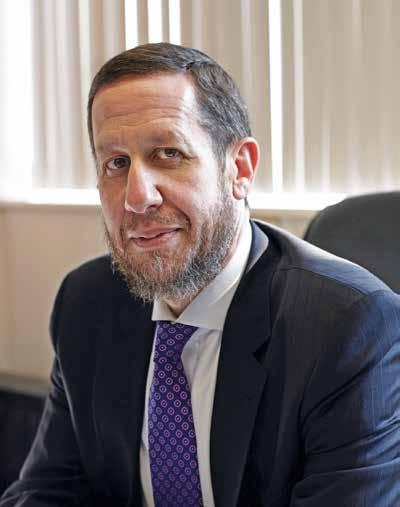
Dear Rabbi
One of the tenets of our Jewish religion is that Earth is only a vestibule. We accept with full belief of the better ‘next world’ Olam Habah and that our Mitzvot on Earth, good deeds, will help there. My problem is, as an orthodox Jew, I do not believe in the “next world” and I fear death. I believe that G-d put me on Earth as a tenant to do my bit during my lifetime. Nothing more. Can I be regarded a truly religious?
Aubrey
Dear Aubrey
It’s hard to believe in something that remains in the abstract and not the practical. You’ve never been to the world to come so you might struggle with the “blind faith.” That said, to think that it all ends here and when the song is over there’s nothing more, is a very
sad thought indeed. In fact, those who believe in a world beyond this one can find solace in knowing their loved ones, when they depart, are somewhere else. Those who think that everything ends here – I cannot understand how they don’t remain eminently inconsolable. Your very question indicates your belief in G-d and that G-d put you here for a particular purpose. We, as human beings are feeble and inasmuch as we should never do things for the sake of reward, if you don’t believe in another place beyond where we receive ultimate reward, why bother doing anything? Because “G-d said so?” And if you choose not to, then what? There’s nothing beyond here!?!
That said, clearly then you are doing things because G-d said so, and not because you anticipate reward thereafter in another realm. Which makes your deeds all the more commendable, for which you will surely receive ultimate reward (whether you believe that now or not). Finally, “being religious” is not determined entirely on the extent of your beliefs as much as your actions.
Next week marks the thirtieth yartzeit of the Lubavitcher Rebbe. Someone once asked him, “Rebbe, I don’t have a long beard, I don’t wear a black hat, I don’t don a long black frock coat. Can I still be a chosid (ardent follower) of yours?” The Rebbe replied: “When someone wakes up in the morning and they ask themselves, ‘how can I make today better than yesterday,’ that is a chosid of mine.”

At Hampshire Heights Ltd, our goal is to provide unparalleled property management services that not only enhance tenant experiences but also maximize landlord investments. This week, we are delighted to share a success story that highlights our commitment to improving occupancy rates and overall property conditions for our clients.
The building was plagued with numerous issues.
A property in Plumstead had been suffering under inadequate management by a previous agent. The building was plagued with numerous issues, including anti-social tenants, disrepair complaints, and frustrated neighbors frequently contacting the council. When one of our clients purchased this troubled property, they turned to us for help.


Upon taking over management, we immediately assessed the situation and took swift action. Our management team informed all tenants that disruptive behavior would no longer be tolerated. We promptly filed for eviction against those tenants who were causing issues, ensuring a peaceful environment for the remaining residents.Next, we brought in our skilled handyman team to renovate the communal areas, giving them a fresh, modern look. We addressed all repair issues, ensuring that the property was safe and comfortable for all tenants. Our proactive approach included communicating with the neighbors on the street, assuring them that we were committed to turning things around. We even put up a sign outside the property with our company details, making it clear who to contact in case of any issuesThanks to our dedicated efforts, the property underwent a remarkable transformation. The anti-social behavior ceased, the repairs were completed, and the communal areas looked better than ever. The neighbors were relieved and impressed with the swift improvements.

Our client was thrilled with the turnaround.

Our client was thrilled with the turnaround. Not only did the property become a more desirable place to live, but the occupancy rates also improved significantly. The successful management of this property in Plumstead is a testament to the expertise and dedication of

If you're a landlord looking to improve your property's occupancy rates and overall condition, trust Hampshire Heights Ltd to deliver outstanding results. Contact us today to see how we can help transform your property and maximize your investment.

268 564


BY RABBI SHMUEL REICHMAN
A speaker once started his seminar by holding up a $100 bill. “Who would like this $100 bill?” he asked.
Every hand in the room went up.
The speaker looked around, and then crumpled the bill in his hand.
“Who wants it now?” he asked.
Every hand in the room remained in the air.
“Well,” he replied, “What about now?” He dropped the bill on the ground and stomped on it with his shoe.
He picked up the now crumpled and dirty bill and showed it to the crowd.
“Who still wants it?”
Every hand was still up in the air.
“My friends, you have just experienced a very powerful lesson. No matter what I do to this money, no matter how crumpled or muddy it gets, it does not decrease in value. Many times in our lives, life has a way of crumpling us up and grinding us in the dirt. We make bad decisions or deal with poor circumstances, and we begin to feel worthless. We feel that Hashem has abandoned us; that He no longer values us. But no matter what has happened, and no matter what will happen, you will never lose your value. You were created b’tzelem Elokim, and nothing can change that.”
Arguably, the most important concept in life is the nature of the soul. Most people believe that they “have” a soul, some spiritual essence they possess within themselves. However, the deeper Jewish sources reveal a profound spiritual secret: You don’t have a soul, you are a soul. In other words, the soul is not an aspect of your self, or some spiritual component of your being; it is your very self. You are a soul, a consciousness, a spiritual being. When you say “I,” you are referring to your soul, your inner sense of self. You have a body, emotions, and an intellect — all different aspects and expressions of your soul. But you are a soul, a neshamah, an infinitely expansive consciousness.
A soul is angelic, perfect, pure, and transcendent. Before entering this world, we exist as this perfect, pure being. (Even when we are the womb, we are in a near perfect, pure state of being — what Chazal refer to as our “fetal self.” See Niddah 30b.) However, the moment we enter the physical world, the infinite expansiveness of our soul is confined within our physical body. The body is the container of the soul, but it is also the soul’s vehicle and tool, allowing the soul to manifest its will in this world. This is our mission in life. We enter this world with an undeveloped vehicle — our limited body. The soul, our existential self, is already perfect, but we don’t yet have access to the fullness of our true self. As we journey through life, we tap into greater and greater aspects of our soul and, our self, and we must then manifest them into the
world through our physical bodies. In doing so, we uplift our physical vessels, enabling them to tap into greater and greater aspects of our true self. This is the beautiful cycle of life, the endless expansion and expression of self into the physical world.
While this perspective is both powerful and fundamental, its implementation is elusive. (It is perhaps humanity’s most central struggle.) Many people believe that they are a body — a physical, finite being. Having forgotten our true selves, we are born with the illusory belief that we are only that which we can see. When we look in the mirror, we see only flesh and bone, and we believe that this is all that we are.
However, this is merely our starting point. The turning point in life is the moment we realize that we are angelic souls in a physical casing. We are not physical beings attempting to have a spiritual experience, we are spiritual beings trying to uplift our physical experience.
There is a paradoxical relationship between the body and the soul:
that it is the wondrous paradox that our soul, infinitely transcendent, remains connected to our bodies, a physical, finite vessel. We mention this specifically after using the bathroom because we have just filtered out the unneeded parts of what we ate or drank, the very means of forging the connection between body and soul.
We can now understand the power of fasting, especially on the day of Yom Kippur. On Yom Kippur, we attempt to live as malachim, completely transcending the physical world. We therefore fast, allowing our soul to slightly disconnect from — and transcend — our body, enabling us to experience one day of living in an angelic state.
This principle sheds light on all the issurim of Yom Kippur as well. We don’t engage in the physical world because Yom Kippur is a day of transcending the physical aspects of human experience. (Physical relations, eating, washing the body, and wearing perfume all require one to engage in the physical.) There is, however, one halachah that still requires elucidation: Why do we remove our shoes on Yom Kippur?

• Your soul, which is your “self,” is transcendent, infinite, and purely spiritual. You cannot see, smell, or touch the consciousness, the mind. You will never see someone else’s inner world.
• The body, however, is finite, limited, and physical. Your soul will never die, but your body will eventually age and wither.
If the soul and body are diametrically opposed, how do they manage to coexist? One would expect them to repel each other like two opposite sides of a magnet.
This is the powerful purpose of food. There needs to be something to keep your soul attached to your body, some kind of “glue.” Eating food generates the energy that keeps your neshamah connected to your body. This is why the lack of eating has the opposite effect. What happens when you don’t eat? You become faint. What happens if you continue to fast? You will pass out. And if you still don’t eat, your soul will leave your body, and you will die. Eating maintains the connection between your soul and your body; it is what keeps you alive.
This is the depth behind the phrase: “U’mafli la’asos — Who performs wonders,” that we recite in Asher Yatzar (the blessing we recite after using the bathroom). What “wonder” are we referring to? Many commentators, such as the Beis Yosef, suggest
instructed to remove both shoes, whereas Yehoshua was commanded to remove only one. Based on the previous discussion, let us now try to understand this mysterious command.
Prophecy was an other-worldly experience. Hashem expanded the Navi’s consciousness, enabling him to connect to a higher dimension of existence — one that lies far beyond the limitations of time and space, far beyond the capacity of the normal human mind. In doing so, the Navi became capable of experiencing lofty ideas and intellectual truths that he would otherwise not have access to. These ideas and truths would then filter down through the Navi’s intellect and get translated by his imaginative faculties, resulting in his unique experience of those objective truths. Nevuah was an other-worldly and angelic experience of the spiritual world that a Navi experienced while still in this world.
This is why Moshe was commanded to remove both of his shoes before receiving nevuah at the burning bush. Before transcending into the spiritual, angelic realm, Moshe had to remove his shoes to loosen the connection between his soul and his body.
The Malbim explains the difference between Moshe and Yehoshua:
The Nefesh Hachaim explains the profound spiritual concept of shoes. The body uses the shoe as its means of traveling through the world. The lowest part of your body rests in your shoes, allowing you to walk. (Nefesh Hachaim 1:5, note 6; see also Ruach Chaim, Avos 1:1.) This relationship — between the body and shoe — is the same relationship between the soul and the body. You are an angelic soul, a neshamah, but the lowest part of your angelic self resides within your physical body, serving as your container, your “shoe,” and this is what allows you to “walk” through the world, to interact with the physical, to actualize your potential. Naal, the Hebrew word for shoe, also means to “lock,” because shoes lock your feet in and allow you to walk around. So too, your body locks your angelic self in, allowing you to use your body to navigate this physical world.
The Nefesh Hachaim explains that the spiritual concept of removing our shoes represents the act of transcending our physical bodies. Taking your “foot” out of your “shoe” represents removing your angelic soul from your body. On Yom Kippur, we aim to transcend our physical bodies and embrace our angelic selves. We therefore remove our shoes, our “physical vessels.”
Both Moshe and Yehoshua were commanded to remove their shoes. Moshe was
• Moshe was on a much higher level of nevuah, and as such, completely transcended his body. This was expressed by removing both of his shoes, reflecting total transcendence. The same is true when Kohanim duchen: When they are performing the avodah, they transcend their bodies and connect to a higher consciousness. This is because their job is to connect the finite to the infinite and to connect Klal Yisrael to Hashem.
• Yehoshua, however, was not on the same level as Moshe, and his nevuah was therefore on a lower level as well. Consequently, he only removed one shoe, representing his partial transcendence during his prophetic experience. He was halfway between the infinite and finite, bridging the gap between the two. The transition to Yehoshua’s leadership represents the transition from Moshe’s transcendent leadership to Yehoshua’s more immanent and this-worldly leadership. This is the transition from the midbar — the stage of constant miracles, to Eretz Yisrael — the stage of hishtadlus (effort), of finding the miraculous within the natural. (See Netziv, Haamek Davar 20:8.)
The goal of life is not to transcend this world while living as angelic and perfect spiritual beings; the goal is to live a transcendent live within this physical world, transforming and uplifting our limited existence into something infinite and eternal. May we be inspired to fully experience our angelic inner selves, while also infusing it into our physical life, elevating our actions and intentions as we move this physical world toward its ultimate spiritual root.

1st Aliya (Kohen) – BAMIDBAR 16:1-13
Korach, from the tribe of Levi, conspires with Datan, Aviram and On from the tribe of Reuven. They gather together 250 leading Israelites and challenge Moshe and Aharon’s rights to leadership. Moshe tells Korach and his assembly to prepare an incense offering in a fire-pan to bring the next morning. Aharon will do the same; whoever’s offering is received by G-d will indicate the rightful leadership. Moshe tries to dissuade the rebels. Datan and Aviram refuse to speak with Moshe, accusing him of “bringing the nation out of the land of Egypt in order to kill them in the desert”.
Point to Consider: Why is Korach’s lineage only listed three generations back and not more? (see Rashi to 16:1)
2nd Aliya (Levi) – 16:14-19
Datan and Aviram continue their tirade against Moshe, who is angered. He declares to G-d that he has received no personal gain from his leadership. The next morning, Korach and his assembly arrive with their incense offerings at the entrance to the Ohel Moed (Tent of Meeting), as does Aharon, accompanied by Moshe.
Aliya (Shlishi) – 16:20-17:8
G-d tells Moshe and Aharon to separate themselves from the rest of the nation, as G-d will immediately destroy Korach and all those people who have been drawn after him, including many of the Israelites (Rashi). Moshe and Aharon plead for mercy. G-d relents, telling Moshe to instruct the nation to distance themselves from Korach, Datan and Aviram in order to prove their allegiance to Moshe. Datan and Aviram remain defiant. Moshe announces that if Korach and his followers die a normal death, then he, Moshe, is not G-d’s rightful appointee. Yet if the ground swallows them up miraculously, then Moshe’s leadership is legitimate. As Moshe finishes speaking, the ground opens up, consuming Korach, some of his followers and all of their property. A fire then consumes Korach’s 250 men whom he had incited to join in the rebellion.

BY RAFI SMITH
In my previous article, I outlined the concept of the ‘negativity bias’, which is that most people tend to lean towards the side of negativity. As mentioned, some of the potential consequences are that we may see more vividly the weaknesses of ourselves and others and less notice the strengths and goodness. We may reflect on our day seeing what we failed to achieve rather than what we did achieve. We may try and initiate change in ourselves with words of self-criticism which lessen our desire to change, rather than with encouragement. As pointed out, we are not looking to ignore the important functions that our negative aspect gives us, rather the goal here will be to create a healthy balance, that whilst we can notice the negatives, we can equally notice the positives too, and approach things in a healthier way.
Neuroplasticity
Recent research in psychology has uncovered the idea of ‘neuroplasticity’. Neuroplasticity is ‘positive news’. It means that our brains maintain the flexibility to still grow and develop well into our adult years. So, though now our brains may be more leaning towards negativity, we have the ability to shift it to a more balanced state of mind. I will try to provide a few ideas that we can use to try
Moshe commands Aharon’s son Elazar to gather up the copper fire pans of those who died in order to make them into a covering for the Mizbeach (Altar). The next day, the people complain to Moshe and Aharon for ‘causing’ so many deaths.
– 17:9-15
In response to the complaints, G-d threatens to wipe out the people. As a fatal plague breaks out, Moshe tells Aharon to place incense in a fire-pan to gain atonement for the complainers. Aharon does so, managing to stop the plague, but not before it kills 14,700 people.
Aliya (Chamishi) – 17:16-24
G-d tells Moshe to gather a staff from each tribe’s leader, with the name of the tribe written on the staff. Aharon’s name is to be written on the staff of Levi. The staffs are to be left in the Ohel Moed; whichever tribe’s staff miraculously blossoms is the rightful leader. The leaders do as instructed. The following morning Aharon’s staff has blossoms with a bud and almonds.
6th Aliya (Shishi) – 17:25-18:20
G-d tells Moshe to preserve Aharon’s staff as a reminder that he was chosen,
lest the people rebel in the future. G-d reiterates Aharon’s duties and the need for the Levi’im to assist him and the other Kohanim. The Kohanim have the privilege of eating certain parts of offerings and certain tithes. The laws of redeeming firstborn male children and bringing firstborn animals as offerings are stated.
7th Aliya (Shevi’i) – 18:21-32
The ‘first tithe’ (ma’aser rishon) taken from crops is given to the Levi’im. They need to separate a portion of this tithe to give to the Kohanim.
Maftir (Bamidbar 28:9-15)
The reading for Shabbat Rosh Chodesh is taken from parashat Pinchas and details the additional Shabbat and Rosh Chodesh offerings in the Temple.
Haftorah (Shabbat Rosh Chodesh)
The special haftarah for Shabbat Rosh Chodesh is the last chapter of the Book of Yeshaya (Isaiah). The world is G-d’s “throne and footstool”. Trying to appease G-d with insincere offerings will be punished, yet one who is truly “zealous regarding G-d’s word” will be rewarded. Those who love and are loyal to Jerusalem will enjoy the messianic future, in which they will rejoice in the rebuilt city.
and make that shift.
Listing and Lingering in Gratitude Gratitude is a powerful tool as through it we recognize and acknowledge the good things that happen in our life. By taking even a frustrating day and asking “What good came out of this?”, whether from G-d or another person, and writing it down (evoking our vision and body), sharing it with another (evoking our hearing), and just lingering and absorbing that positive feeling or experience into our hearts a few times daily, we train our minds to start to shift towards naturally noticing, absorbing and appreciating the positive experiences in our everyday.

Change the Self-Talk
Some people find their self-talk to be negative and critical. Already as children, we may have been raised to notice our weaknesses, faults, and mistakes. Growing older, the pattern is likely to continue, noticing weaknesses and faults in ourselves, and using this same voice of criticism as a way to manipulate ourselves
into change. Whilst this makes us aware of the need to change, the voice of a self-critic sounds more like a sadistic ruler than an encouraging friend. Making changes in our lives and character is difficult. Are we more likely to feel safe and trusting in taking those steps from a voice of tyranny or the voice of caring compassion?
Validating that we are humans with strengths and weaknesses, that changes are hard and scary, and talking with kindness, compassion, and encouragement
will likely awaken within us the power of change, and if you don’t believe me, try it first!
Reframing situations see our Accomplishments
As I am writing this article, I suddenly think about the time I have now lost for other things. Though that is true, what is more significant is my accomplishment and value here, which is producing a meaningful article that others can grow and benefit from!
Perhaps I will worry that this article won’t turn out as good as I would like. But again, what is more important, is the helpful messages it contains and the positive effect it can have on people! Uncovering Strengths
We can all list our weaknesses and failures. But how about creating a list that is even half as long, that identifies our possible strengths and achievements? We might even shock ourselves at this new way of looking at ourselves, noticing more of what we can do and what we have to offer. What about thinking of the goodness in those around us? Doesn’t that make them more enjoyable to be around?!
In conclusion: The negativity bias has its place and purpose, but also its limitations. By being able to nurture that positive part of our minds, we enable ourselves to really thrive and grow into more beautiful, fulfilled, and positive people and more attuned to the positive experiences in our lives.
Rafi Smith is a Clinical Counsellor/ Psychotherapist, based in Jerusalem, with experience working with clients with anxiety, low self-esteem, OCD, addiction, ADHD, and relationship issues. For questions, feedback or inquiries: Email: rafismithers@gmail.com or call/ WhatsApp +972527160858.
(For previous articles: www.linkedin.com/ in/rafi-smith-32194b265)
Using all the shapes, can you make the shape on the right?
The goal of a word wheel puzzle is to create as many words possible with the letters in the word wheel. Each word must contain at least three letters. You can only use each letter once and every word must have the letter in the centre of the wheel.
Last edition’s words
Here are some words you may have found from last week – you may have found more!
I U T R S Y O C
Use the area below to write the words you have found.
Q: Where do young cows eat lunch?
A: In the calf-ateria!
Q: What is Whitney H's favourite kind of coordination?
A: Haaaaand eyyyyeeeeeeeeee
Q: What did the policeman say to his tummy?
A: Freeze, you’re under a vest!
1. I am a box that holds keys without locks, yet they can unlock your soul. What am I?
2. Two in a corner, one in a room, zero in a house but one in a shelter. What am I?
3. My life can be measured in hours, I serve by being devoured. Thin I am quick, fat I am slow. Wind is my foe. What am I?

Pricing your home
Dear Richard,
I am ready to make Aliya but the thought of having to start the process of selling up is driving me crazy. What advice can you offer?
Regards, Duvi
Hi Duvi,
Selling your home can be a daunting undertaking, especially if you have never sold one before. Here are some things to keep in mind as you are preparing to sell your home.
The most important factor when putting your home on the market to sell, is setting the right price. The price at which your property is marketed can make or break the deal. Over-pricing of the property may result in:
a) A smaller buyers’ pool b) A prolonged stay on the market that will result in lower offers being submitted
Under-pricing of the property may result in:
a) You losing money on your investment b)A buyer offering an even lower amount due to a negative perception of the property or area
Factors affecting the sale of your home
It’s often more emotional to sell a home than to buy a home, and the reason for selling your home may be a determining factor in the urgency of the sale. The urgency may also have an effect on the price of the property.
It’s important to take the following factors that can influence the sale of your home into consideration:
a) Reason for selling b) Location c) Condition of property d) Size e) Design / style f) Accessibility
The Cost of Selling
It’s very important to first calculate the expenses that may be incurred while selling your home. This knowledge is absolutely necessary because it helps you to determine a good price for the house, as well as the potential profit that you can realise.
The cost of selling your home may include things like:
a) commission to be paid to the agent b) taxes c) advertising costs d) specific reports, such as a property inspection.
Location
Although you cannot do anything about the location of your property, it plays a very important part in the marketability of your home. So it’s important to take the following into consideration:
a) Is your property priced in relation to other offers in your area?
b) What type of neighbourhood is your property located in — well established, up-andcoming, transitional?
c) Is your property located in an urban or rural area?
I will continue another time looking at other considerations: staging, accessibility and conditions of your property
Richard
KOSHER DELI
Kosher Deli was established with the intention of making kosher meat and poultry affordable for all with the convenience of multiple locations and a comprehensive delivery service. All this without compromising on kashrus or quality.
Locations in: Golders Green, Hendon, Temple Fortune, Edgware, Borehamwood & Manchester

Contact: 020 8381 4450 info@kosherdeliuk.co.uk www.kosherdeli.co.uk

MARTIN FRYDENSON - ROUNDTREE REAL ESTATE
Roundtree Real Estate are your local experienced Estate Agent having been established on the High Street since 2009. We are both ARLA and NAEA Propertymark regulated and we are here to offer you expert advice in Property Sales, Lettings, Commercial and Full Management Services, covering Hendon, Golders Green, Finchley, Colindale and surrounding areas. We have built long standing relationships with all our clients and should you have any property related queries please do contact us.

Contact: 020 8203 2111 mail@theroundtree.com www.theroundtree.com
JACOB BERNSTEIN LLB (Hons) CeMAP
A member of the APCC, specialising in financial services compliance for: Mortgage, Protection and General Insurance Intermediaries
• Lenders, Credit Brokers, Debt Counsellors, Debt Administrators and Debt Collectors Wealth Management (Portfolio Management and Advice Services), Capital Markets (Asset Management and Broker Dealers), Wholesale Investment Firms (Fund Managers, Corporate Finance and Private Markets)
• Payment Services, PISP, AISP and E-Money.

Contact: 020 7781 8019 info@richdale.co.uk www.richdale.co.uk

Book a FREE meeting with UKAA’s founder Gary Brown, who will go through your particular needs and wants on a the PRACTICAL side of leaving your country of origin and/or living in/moving to Israel. This is both for pre and post- Aliyah Olim.
This FREE meeting will allow Gary to advise on who you need to speak with for each requirement and when in the year you should approach them. Confidentiality assured.

Contact: +972 (0)2 372 3775 / +44 (0)20 3 989 5080 info@aliyahadvisors.com aliyahadvisors.com/aloh-naaleh/
JEWISH CARE
Jewish Care is the largest health and social care organisation serving the Jewish community in London and the South East. Our vital services touch the lives of 10,000 people every week. We provide services and offer a wide range of support groups to older people, people with mental health needs, Holocaust survivors, people living with dementia, people with a variety of needs and carers support.

Contact: 020 8922 2222 helpline@jcare.org www.jewishcare.org





